In Focus This Week
Security and Wellness
Last-minute resources for securing the election and keeping everyone sane while doing so
By M. Mindy Moretti
electionline.org
With just over three weeks to go until Election Day, this week we’ll take a look at some resources available to elections officials to ensure election security and to make sure officials and their staff are mentally OK, as well as physically.
While there is a lot of information about election security and wellness, we reached out to some partner groups for their suggestions on things, be it security measures or wellness plans, that can still be implemented with the short calendar.
Election Security
The Cybersecurity & Infrastructure Security Agency (CISA) has it’s #Protect2024 site filled with information about how to protect against the cyber, physical, and operational security risks to election infrastructure during the 2024 election cycle. But for some of  those recommendations, the time has come and gone. Last minute recommendations include:
those recommendations, the time has come and gone. Last minute recommendations include:
2024 General Election Cycle: Voluntary Incident Reporting Guidance for Election Infrastructure Stakeholders | CISA: This informational product provides a list of offices and agencies to contact to share information about incidents. It also provides examples of common cyber and physical security incidents that election infrastructure stakeholders are encouraged to report. Stakeholders are encouraged to share information about incidents as soon as possible. Always call 9-1-1 if there is an imminent threat.
Personal Security Considerations Action Guide | CISA: This guide helps critical infrastructure workers assess their security posture and provides options to consider whether they are on or off the job. This action guide provides actionable recommendations and resources intended to prevent and mitigate threats to a critical infrastructure worker’s personal safety.
CISA Insights: Mitigating the Impacts of Doxing on Critical Infrastructure | CISA: This product provides information, guidance, and resources to critical infrastructure owners and operators, security professionals, and the general public.
 The Elections Group’s Election Learning Lab has three courses for election officials and workers that are meant to enhance basic awareness of artificial intelligence, election observation and de-escalation.
The Elections Group’s Election Learning Lab has three courses for election officials and workers that are meant to enhance basic awareness of artificial intelligence, election observation and de-escalation.
Other security-related resources from The Elections Group include:
- De-Escalation Pocket Guide and Poster
- Avoiding F(AI)kes: Practices for Verifying Communications With People You Trust
- Secure HQ Checklist
 The Committee for Safe and Secure Elections has some additional tools including:
The Committee for Safe and Secure Elections has some additional tools including:
- Four Steps to Working with Challenging Visitors (available in a 2-pager as well); and
- Combatting Swatting Attempts
Wellness
In 2023, the Henderson, Nevada city clerk’s office won a Professional Practice Paper award from the Election Center for their Peace Polls and Pups: Mental Health & Wellness in an Elections Environment. Following a series of stressful elections where many election staff members became ill during or directly after the election, the Clerk’s Office worked with the city’s Mental Health & Wellness Program Manager that would help keep staff healthy and happy. The City of Henderson’s focus on mental health and wellness, during our 2023 Special Election, showed that small actions can have a huge impact on the wellbeing of staff members.
Polls: During an election, the staff interact with thousands of voters and are exposed to a myriad of germs. Normal precautions, such as cleaning and sanitizing protocols were implemented. According to Healthline, anecdotal evidence suggests that essential oils may have  immune boosting effects. In addition to sanitizing practices, an oil diffuser was deployed, which continually diffused oils shown to promote immune defense. Additionally, staff members were provided with snacks and drinks onsite to encourage frequent short breaks for sustenance and hydration.
immune boosting effects. In addition to sanitizing practices, an oil diffuser was deployed, which continually diffused oils shown to promote immune defense. Additionally, staff members were provided with snacks and drinks onsite to encourage frequent short breaks for sustenance and hydration.
Peace: Dealing with the public, especially in an election setting, can be stressful. In order to provide a respite from the stress, a “tap out” space and room were created. One space was in a hallway next to the vote center and included some comfortable chairs and flyers with several stress management techniques. This area was an ideal space for a quick  hydration break. Additionally, the Clerk’s Office converted a little used storage closet into a dark and quiet area where staff could take a few minutes of alone time to relax and recharge. This area included chairs, an oil diffuser diffusing oils shown to enhance relaxation, and the flyers of stress management techniques.
hydration break. Additionally, the Clerk’s Office converted a little used storage closet into a dark and quiet area where staff could take a few minutes of alone time to relax and recharge. This area included chairs, an oil diffuser diffusing oils shown to enhance relaxation, and the flyers of stress management techniques.
Pups: On election day, the Clerk’s Office partnered with Molly, a licensed therapy dog, to provide pets and cuddles. Molly provided a much-needed distraction on a very busy day. Her presence brought smiles to staff and voters alike. Molly was the MVP of election day!
TEG Wellness and Resilience “In a Box” series is designed to empower election officials with practical tools and resources for maintaining well-being amidst the challenges of their roles. Each one-page document offers quick exercises, tips and resources to promote self-care, build resilience, and manage stress during busy work days.
- The Power of Mindfulness
- Checking in with Yourself
- Healthy Sleep Habits
- Stress Relief Techniques
- Stretching and Relaxation
The Carter Center released a guide, Taking Care of Yourself and Your Team, that is intended to provide resources to election officials to 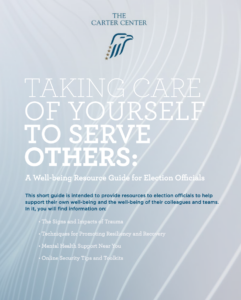 support their mental and physical well-being and that of their colleagues and staff. In the resource guide you will find information on:
support their mental and physical well-being and that of their colleagues and staff. In the resource guide you will find information on:
- Recognizing the Signs of Stress, Burnout, and Trauma
- Making Room for Wellness: Resources and Toolkits
- Mental Health Resources and Support
- Security Tips and Toolkits for Election Officials
From the guide: Many of the resources included in this guide start with the notion of self-care. That said, framing wellness in terms of self-care can sometimes feel selfish and isolating, as if one is left on one’s own when it comes to wellness. A more helpful way to think about wellness is that it involves several individuals, all of whom make up a community. In other words, we should promote taking care of ourselves as well as taking care of others. By taking care of ourselves, we can navigate challenging situations and in turn take care of others.
Voter Education Week
You are invited to the Election Day Voting Party
Celebrating National Voter Education Week
By Lia Merivaki and Mara Suttmann-Lea
If wedding planning is not on your election bingo card, it should be. We have heard many election officials compare running elections to planning multiple weddings that take place simultaneously across different locations in their jurisdictions. Like weddings, the expectation is that on Election Day everything has to be perfect, and everyone should have a great experience.
Our community knows just how many hats election officials wear: they’re administrators, communicators, tech experts, and emergency responders. And with early voting already underway in many states, these officials are in full election mode, navigating high-pressure environments while ensuring everything runs smoothly. And they do this work while navigating a high-risk environment that makes them a target.
But they don’t stop there. Election officials are also tapping into their social media game, connecting with voters online and offline to share crucial updates. Whether it’s debunking myths, posting deadlines, or handling last-minute emergencies, they’re using every platform available to make sure voters have accurate, reliable information.
On National Voter Education Week, we on team voter education want to showcase the tremendous work election officials across the country are doing to educate voters about “the times, places, and manner of elections,” build confidence that U.S. elections are free, fair, and safe, and bring in more voters to celebrate democracy on Election Day.
We launched the Election Officials Communication Tracker to document the various ways election officials discuss elections and voting in their communities, and to highlight how community is built on the ground, through outreach and partnerships with local stakeholders, from highschools and colleges, to public libraries, Rotary Clubs, and yes, even sports teams and breweries.
We track over 1,500 accounts from state and local election offices on Facebook, X, Instagram, TikTok, and Threads, and label content shared on these platforms using a comprehensive list of election-related labels. Our labels help organize this content by method of delivery, type, theme, and strategy. Between August and September, we have collected, and currently label over 29,157 posts from state and local election officials.
State and local election officials’ post activity on various social media platforms, August-September 2024.
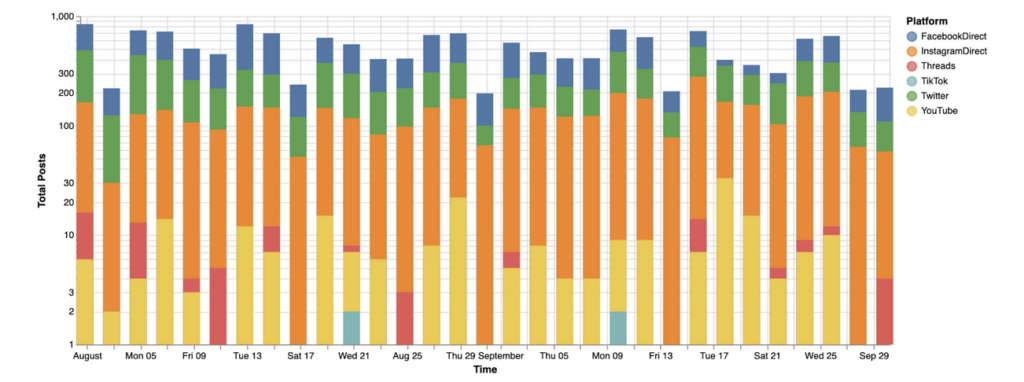
The Tracker’s findings from 2024 show how election officials are using major election events to educate and engage voters. For example, on National Poll Worker Recruitment Day (August 1) election officials reminded voters that poll workers are their neighbors and community members—building trust, one local connection at a time.
National Poll Worker Recruitment Day, August 1, 2024
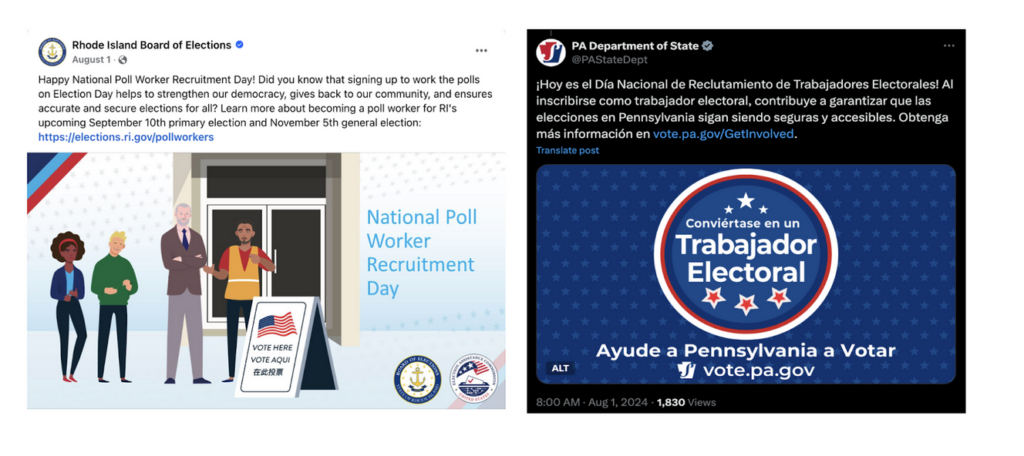
During National Disability Voting Rights Week (September 9-13), EOs highlighted accessible voting options, partnering with disability rights organizations to ensure every voice is heard.
National Disability Voting Rights Week, September 9-13, 2024
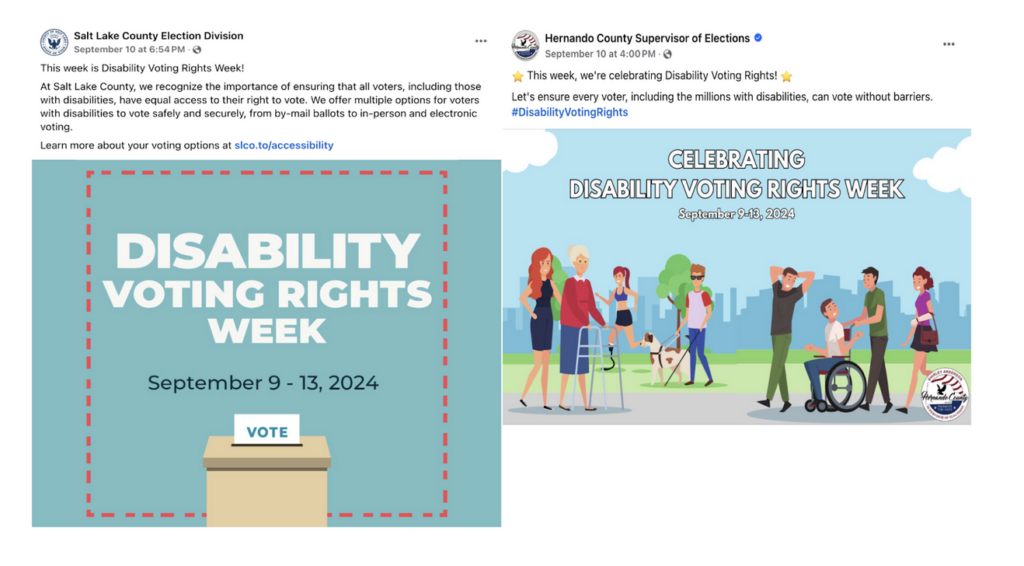
The highlight of September is National Voter Registration Day (September 17) where election offices flooded social media with info on how to register, verify, or update one’s voter registration, alongside in-person outreach events in high schools, public libraries, and yes, breweries and restaurants.
National Voter Registration Day, September 17, 2024
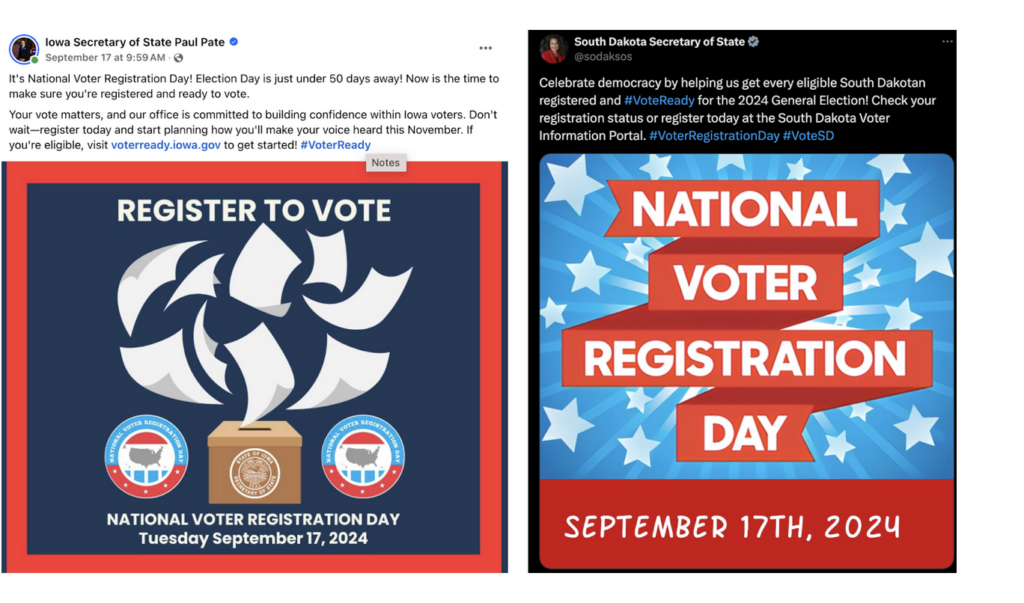
Why are we doing this work?
In our view, election officials are central actors in the election ecosystem, whose efforts to educate voters about how to vote and how elections are kept secure can move the needle in building trust in elections, as well as help identify participation gaps across underserved populations. In an era where the dissemination of low quality content is supercharged by technologies such as AI, the potential to drown out credible sources of information is higher than ever. Understanding, therefore, how communications flow in the current ecosystem, and which strategies are more effective in building resilient information ecosystems is what drives our work.
To learn more about the 2024 EO Communications Tracker, visit our website, and explore our first Month in Review newsletter.
electionline Daily News Email
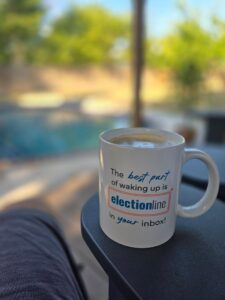 What’s the best part of waking up? electionline Daily News in your inbox of course so be sure to sign up for your daily dose.
What’s the best part of waking up? electionline Daily News in your inbox of course so be sure to sign up for your daily dose.
Each morning you’ll receive the top headlines of the day, plus a listing of states featured in that day’s news round up.
To sign up, simply visit our site and provide us with your email and you’ll begin receiving the news in your inbox each morning.
We Google so you don’t have to!
Election Security Updates
 DOJ News: On Tuesday, October 8, the U.S. Department of Justice announced charges against a citizen of Afghanistan residing in Oklahoma, for conspiring to conduct an Election Day terrorist attack in the United States on behalf of the Islamic State of Iraq and al-Sham (ISIS). According to a criminal complaint filed, Nasir Ahmad Tawhedi, 27, conspired and attempted to provide material support to ISIS and obtained firearms and ammunition to conduct a violent attack on U.S. soil in the name of ISIS. As part of the plot, the defendant allegedly took steps to liquidate his family’s assets, resettle members of his family overseas, acquire AK-47 assault rifles and ammunition, and commit a terrorist attack in the United States. “As charged, the Justice Department foiled the defendant’s plot to acquire semi-automatic weapons and commit a violent attack in the name of ISIS on U.S. soil on Election Day,” said Attorney General Merrick B. Garland. “We will continue to combat the ongoing threat that ISIS and its supporters pose to America’s national security, and we will identify, investigate, and prosecute the individuals who seek to terrorize the American people. I am deeply grateful to the public servants of the FBI, National Security Division, and U.S. Attorney’s Office for the Western District of Oklahoma for their work to disrupt this attack and for the work they do every day to protect our country.” According to the criminal complaint, as part of the investigation into Tawhedi, the FBI searched Tawhedi’s phone and obtained communications between Tawhedi and a person who facilitated recruitment, training, and indoctrination of persons who expressed interest in terrorist activity and who Tawhedi understood to be affiliated with ISIS. Tawhedi was also seen in a video recorded on July 20 reading to two children text that describes the rewards a martyr receives in the afterlife. Tawhedi also allegedly accessed, viewed, and saved ISIS propaganda on his iCloud and Google account, participated in pro-ISIS Telegram groups, and contributed to a charity which fronts for and funnels money to ISIS. “This defendant, motivated by ISIS, allegedly conspired to commit a violent attack, on Election Day, here on our homeland,” said FBI Director Christopher Wray. “I am proud of the men and women of the FBI who uncovered and stopped the plot before anyone was harmed. Terrorism is still the FBI’s number one priority, and we will use every resource to protect the American people.” The complaint alleges that while liquidating their family’s assets prior to the attack, Tawhedi and his co-conspirator, who is a juvenile, advertised the sale of the family’s personal property on Facebook. At the FBI’s direction, a confidential human source responded to inquire if a computer was still for sale. The FBI source noted that he needed the computer for a new gun business he was starting, which ultimately led Tawhedi and the juvenile to meet with the source and other FBI assets at a rural location to test firearms. Tawhedi expressed interest in purchasing two AK-47 assault rifles, magazines, and ammunition from the source. According to the criminal complaint, on Oct. 7, Tawhedi and the juvenile met with the FBI assets at a rural location in the Western District of Oklahoma and purchased, received, and took possession of two AK-47 assault rifles, ten magazines, and 500 rounds of ammunition. Upon receipt of the rifles and ammunition, Tawhedi and the juvenile were arrested. In his seized communications, Tawhedi allegedly indicated that his attack was planned for Election Day, and in a post-arrest interview, Tawhedi allegedly confirmed the attack was planned for Election Day targeting large gatherings of people, during which he and the juvenile were expected to die as martyrs. Tawhedi was charged with conspiring and attempting to provide material support to ISIS, which carries a maximum prison sentence of 20 years, and receiving a firearm to be used to commit a felony or a federal crime of terrorism, which carries a maximum prison sentence of 15 years, if convicted. The case is being investigated by the FBI Oklahoma City Field Office, with valuable assistance from the Oklahoma City Police Department and the Moore, Oklahoma Police Department.
DOJ News: On Tuesday, October 8, the U.S. Department of Justice announced charges against a citizen of Afghanistan residing in Oklahoma, for conspiring to conduct an Election Day terrorist attack in the United States on behalf of the Islamic State of Iraq and al-Sham (ISIS). According to a criminal complaint filed, Nasir Ahmad Tawhedi, 27, conspired and attempted to provide material support to ISIS and obtained firearms and ammunition to conduct a violent attack on U.S. soil in the name of ISIS. As part of the plot, the defendant allegedly took steps to liquidate his family’s assets, resettle members of his family overseas, acquire AK-47 assault rifles and ammunition, and commit a terrorist attack in the United States. “As charged, the Justice Department foiled the defendant’s plot to acquire semi-automatic weapons and commit a violent attack in the name of ISIS on U.S. soil on Election Day,” said Attorney General Merrick B. Garland. “We will continue to combat the ongoing threat that ISIS and its supporters pose to America’s national security, and we will identify, investigate, and prosecute the individuals who seek to terrorize the American people. I am deeply grateful to the public servants of the FBI, National Security Division, and U.S. Attorney’s Office for the Western District of Oklahoma for their work to disrupt this attack and for the work they do every day to protect our country.” According to the criminal complaint, as part of the investigation into Tawhedi, the FBI searched Tawhedi’s phone and obtained communications between Tawhedi and a person who facilitated recruitment, training, and indoctrination of persons who expressed interest in terrorist activity and who Tawhedi understood to be affiliated with ISIS. Tawhedi was also seen in a video recorded on July 20 reading to two children text that describes the rewards a martyr receives in the afterlife. Tawhedi also allegedly accessed, viewed, and saved ISIS propaganda on his iCloud and Google account, participated in pro-ISIS Telegram groups, and contributed to a charity which fronts for and funnels money to ISIS. “This defendant, motivated by ISIS, allegedly conspired to commit a violent attack, on Election Day, here on our homeland,” said FBI Director Christopher Wray. “I am proud of the men and women of the FBI who uncovered and stopped the plot before anyone was harmed. Terrorism is still the FBI’s number one priority, and we will use every resource to protect the American people.” The complaint alleges that while liquidating their family’s assets prior to the attack, Tawhedi and his co-conspirator, who is a juvenile, advertised the sale of the family’s personal property on Facebook. At the FBI’s direction, a confidential human source responded to inquire if a computer was still for sale. The FBI source noted that he needed the computer for a new gun business he was starting, which ultimately led Tawhedi and the juvenile to meet with the source and other FBI assets at a rural location to test firearms. Tawhedi expressed interest in purchasing two AK-47 assault rifles, magazines, and ammunition from the source. According to the criminal complaint, on Oct. 7, Tawhedi and the juvenile met with the FBI assets at a rural location in the Western District of Oklahoma and purchased, received, and took possession of two AK-47 assault rifles, ten magazines, and 500 rounds of ammunition. Upon receipt of the rifles and ammunition, Tawhedi and the juvenile were arrested. In his seized communications, Tawhedi allegedly indicated that his attack was planned for Election Day, and in a post-arrest interview, Tawhedi allegedly confirmed the attack was planned for Election Day targeting large gatherings of people, during which he and the juvenile were expected to die as martyrs. Tawhedi was charged with conspiring and attempting to provide material support to ISIS, which carries a maximum prison sentence of 20 years, and receiving a firearm to be used to commit a felony or a federal crime of terrorism, which carries a maximum prison sentence of 15 years, if convicted. The case is being investigated by the FBI Oklahoma City Field Office, with valuable assistance from the Oklahoma City Police Department and the Moore, Oklahoma Police Department.
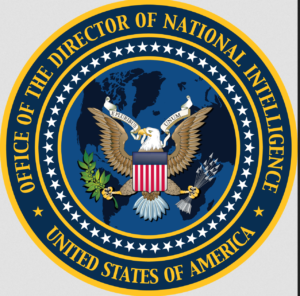 ODNI News: This week, the Office of the Director of National Intelligence released its 30 Day Election Security Update. According to the update, a range of foreign actors continue to try to influence U.S. elections as we approach November. These activities include broad efforts aimed at undermining trust in U.S. democratic processes and exacerbating divisions in our society, while also seeking to shape voter preferences toward specific candidates. Our assessments about the activities and goals of Russia, Iran, and China are unchanged from earlier election security updates. On the presidential race, the IC continues to assess that Russia prefers the Former President and Iran prefers the Vice President; China is not seeking to influence the Presidential election. As we approach election day, the IC also expects foreign influence actors to continue their campaigns by calling into question the validity of the election’s results after the polls close. Foreign actors are almost certainly considering the possibility of another contested presidential election and a tight contest for control of both the Senate and the House of Representatives. They will likely take advantage of such an opportunity to use similar tactics in a post-election period to undermine trust in the integrity of the election, election processes, and further exacerbate divisions among Americans.
ODNI News: This week, the Office of the Director of National Intelligence released its 30 Day Election Security Update. According to the update, a range of foreign actors continue to try to influence U.S. elections as we approach November. These activities include broad efforts aimed at undermining trust in U.S. democratic processes and exacerbating divisions in our society, while also seeking to shape voter preferences toward specific candidates. Our assessments about the activities and goals of Russia, Iran, and China are unchanged from earlier election security updates. On the presidential race, the IC continues to assess that Russia prefers the Former President and Iran prefers the Vice President; China is not seeking to influence the Presidential election. As we approach election day, the IC also expects foreign influence actors to continue their campaigns by calling into question the validity of the election’s results after the polls close. Foreign actors are almost certainly considering the possibility of another contested presidential election and a tight contest for control of both the Senate and the House of Representatives. They will likely take advantage of such an opportunity to use similar tactics in a post-election period to undermine trust in the integrity of the election, election processes, and further exacerbate divisions among Americans.
Election Threat Landscape: The Multi-State Information Sharing & Analysis Center (MS-ISAC), the Elections Infrastructure Information Sharing & Analysis Center (EI-ISAC), the Electricity Information & Analysis Center (E-ISAC), the Faith-Based Information Sharing & Analysis Organization (FB-ISAO), and the Water Information Sharing & Analysis Center (WaterISAC) have authored a white paper on the 2024 Election Threat Landscape. This paper discusses threats from the cyber, physical, and hybrid perspectives and includes recommendations for election offices and associated parties to implement to improve their preparedness.
- A wide array of cyber threat actors (CTAs) are likely to target election offices, election officials, and voters using opportunistic and targeted campaigns as well as leverage emerging technologies, such as generative artificial intelligence (Generative AI), and developments in more common tactics like phishing.
- Observed malicious campaigns included election-specific lures and the use of stolen election correspondence to increase the likelihood of success.
- Ransomware attacks pose a threat to election offices, even if they are not the direct target of the attack.
- CTAs will increasingly aim to sell election-related information online leading up to the 2024 U.S. general election, taking advantage of the increased interest surrounding the election.
- Politically motivated hacktivists are highly likely to increase elections-focused targeting throughout the 2024 election cycle due to the hacktivism resurgence brought on by the Israel-Hamas and Russia-Ukraine wars.
- Election officials and poll workers are likely to be targeted with physical threats online and in-person. False narratives regarding elections infrastructure will likely influence and direct threat actors (TAs) to target the U.S. electoral system and companies facilitating elections. Supporters of these narratives may become motivated to take physical action.
Joint Intelligence Bulletin: This Joint Intelligence Briefing provides an overview of potential threats of violence from domestic violent extremists (DVEs) during the 2024 general election cycle.a It does not address potential threats originating outside the domestic terrorism sphere. DVEs’ mobilization to violence depends on a blend of ideological, sociopolitical, and personal grievances, which vary among individual extremists; their reaction to divisive topics in public discourse; and their access to potential targets. The FBI and DHS advise federal, state, local, tribal, and territorial government and law enforcement officials and private sector security partners to remain vigilant of these potential threats.
 Fact Sheet from CISA and the FBI: The Cybersecurity and Infrastructure Security Agency (CISA) and Federal Bureau of Investigation (FBI) published a fact sheet today, How to Protect against Iranian Targeting of Accounts Associated with National Political Organizations. Actors affiliated with the Iranian Government’s Islamic Revolutionary Guard Corps (IRGC) are using social engineering techniques across email and chat applications
Fact Sheet from CISA and the FBI: The Cybersecurity and Infrastructure Security Agency (CISA) and Federal Bureau of Investigation (FBI) published a fact sheet today, How to Protect against Iranian Targeting of Accounts Associated with National Political Organizations. Actors affiliated with the Iranian Government’s Islamic Revolutionary Guard Corps (IRGC) are using social engineering techniques across email and chat applications 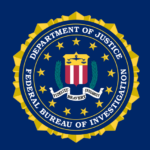 probably to stoke discord and undermine confidence in U.S. democratic institutions. This fact sheet provides recommended actions to protect against this malicious activity. IRGC actors target and compromise the personal and business accounts of Americans, in particular. individuals associated with national political organizations. They also target individuals and organizations working or have worked on issues related to Iranian and Middle Eastern affairs. CISA and the FBI recommend mitigations and best practices that will help organizations and individuals strengthen their security and resilience, including keeping applications and operating systems updated, training staff to only use official accounts for business, and implementing phishing-resistant multifactor authentication (MFA). “With FBI, CISA works to provide timely, actionable information that helps our partners reduce their risk from myriad threats,” said CISA Executive Assistant Director for Cybersecurity, Jeff Greene. “IRGC cyber actors pose an ongoing and escalating risk. We urge individuals and organizations associated with national political organizations or campaigns to review and implement actions in this joint fact sheet.”
probably to stoke discord and undermine confidence in U.S. democratic institutions. This fact sheet provides recommended actions to protect against this malicious activity. IRGC actors target and compromise the personal and business accounts of Americans, in particular. individuals associated with national political organizations. They also target individuals and organizations working or have worked on issues related to Iranian and Middle Eastern affairs. CISA and the FBI recommend mitigations and best practices that will help organizations and individuals strengthen their security and resilience, including keeping applications and operating systems updated, training staff to only use official accounts for business, and implementing phishing-resistant multifactor authentication (MFA). “With FBI, CISA works to provide timely, actionable information that helps our partners reduce their risk from myriad threats,” said CISA Executive Assistant Director for Cybersecurity, Jeff Greene. “IRGC cyber actors pose an ongoing and escalating risk. We urge individuals and organizations associated with national political organizations or campaigns to review and implement actions in this joint fact sheet.”
Election News This Week
 Helene Follow-Up: While Floridians are still assessing the damage from Hurricane Milton, Florida and the states pummeled by Hurricane Helene are working on how they will ensure impacted voters can cast their ballots between now and November 5. Here’s a look at where they stand. In Florida, Gov. Ron DeSantis issued an executive order authorizing election changes in 10 counties trying to recover from Hurricane Helene. DeSantis’ order allows supervisors of elections in heavily damaged areas to make changes to early voting sites and to set up consolidated voting centers where people can cast ballots. The order also loosens restrictions on requests for mail-in ballots and allows state employees to take paid administrative leave to serve as poll workers on Election Day. The governor’s action came as supervisors throughout the state are mailing ballots to voters for the Nov. 5 election. A bid to extend the state’s voter registration deadline failed in court. In Georgia, Secretary of State Brad Raffensperger said earlier this week that local election officials are back on schedule Monday for the first day to mail out absentee ballots and remain on track for the start of voting on Oct. 15. County election offices were spared from any significant damage caused by the storm. Raffenspeger credited the county election supervisors for dealing with challenges of lost internet and electricity during the storm’s tear through Georgia. County election officials “really put public service first because they understand how important voting is in 53 counties that so far have been declared federal disaster areas,” Raffensperger said during the media briefing. “Our office is working hard to make sure the counties have what they need so it can go off without a hitch.” In North Carolina, the State Board of Elections this week voted unanimously to make casting a ballot easier for residents in the 13 western counties that were most devastated by flooding from Hurricane Helene. Karen Brinson Bell, the board’s executive director, said she plans to start early voting in all 100 counties as scheduled, on Oct. 17. She said that all county elections offices in the Helene-impacted areas have now reopened. But she said there are about 10 early voting sites in the disaster area that are unusable as of now. There are also early voting sites that are currently being used for emergency response, such as fire stations. “We also plan to provide as much voting opportunity as we can, recognizing that we may need to take voting to the people,” she said. County elections boards may need to change early voting sites and Election Day polling places. They also might need to change voting hours. The General Assembly approved $5 million for election administration in 25 counties by the storm. In Tennessee, Secretary of State Tre Hargett announced how voting will move forward in the impacted counties. “The devastation experienced in northeast Tennessee is heartbreaking and unimaginable,” Hargett said in a press release on Oct. 9. “However, I continue to be amazed at the planning and resiliency of our local election officials.” Some counties will extend early voting hour during the period that begins on October 16th. And some counties will have to move polling places entirely, or adjust what rooms are used at existing locations.
Helene Follow-Up: While Floridians are still assessing the damage from Hurricane Milton, Florida and the states pummeled by Hurricane Helene are working on how they will ensure impacted voters can cast their ballots between now and November 5. Here’s a look at where they stand. In Florida, Gov. Ron DeSantis issued an executive order authorizing election changes in 10 counties trying to recover from Hurricane Helene. DeSantis’ order allows supervisors of elections in heavily damaged areas to make changes to early voting sites and to set up consolidated voting centers where people can cast ballots. The order also loosens restrictions on requests for mail-in ballots and allows state employees to take paid administrative leave to serve as poll workers on Election Day. The governor’s action came as supervisors throughout the state are mailing ballots to voters for the Nov. 5 election. A bid to extend the state’s voter registration deadline failed in court. In Georgia, Secretary of State Brad Raffensperger said earlier this week that local election officials are back on schedule Monday for the first day to mail out absentee ballots and remain on track for the start of voting on Oct. 15. County election offices were spared from any significant damage caused by the storm. Raffenspeger credited the county election supervisors for dealing with challenges of lost internet and electricity during the storm’s tear through Georgia. County election officials “really put public service first because they understand how important voting is in 53 counties that so far have been declared federal disaster areas,” Raffensperger said during the media briefing. “Our office is working hard to make sure the counties have what they need so it can go off without a hitch.” In North Carolina, the State Board of Elections this week voted unanimously to make casting a ballot easier for residents in the 13 western counties that were most devastated by flooding from Hurricane Helene. Karen Brinson Bell, the board’s executive director, said she plans to start early voting in all 100 counties as scheduled, on Oct. 17. She said that all county elections offices in the Helene-impacted areas have now reopened. But she said there are about 10 early voting sites in the disaster area that are unusable as of now. There are also early voting sites that are currently being used for emergency response, such as fire stations. “We also plan to provide as much voting opportunity as we can, recognizing that we may need to take voting to the people,” she said. County elections boards may need to change early voting sites and Election Day polling places. They also might need to change voting hours. The General Assembly approved $5 million for election administration in 25 counties by the storm. In Tennessee, Secretary of State Tre Hargett announced how voting will move forward in the impacted counties. “The devastation experienced in northeast Tennessee is heartbreaking and unimaginable,” Hargett said in a press release on Oct. 9. “However, I continue to be amazed at the planning and resiliency of our local election officials.” Some counties will extend early voting hour during the period that begins on October 16th. And some counties will have to move polling places entirely, or adjust what rooms are used at existing locations.
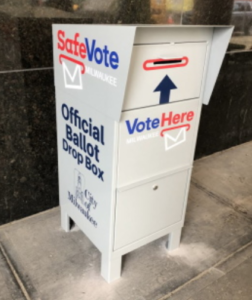 Dropbox Updates: We have a follow-up to some dropbox news from last week as well as some new controversies. In Wausau, Wisconsin, where the mayor made headlines last week for removing the city’s dropbox citing security reasons, the city council voted this week say the dropbox stays and without $3,000 in added security the mayor had demanded from the city council. At a meeting this week, members of the public packed the City Hall chamber to offer comments both in opposition to and in support of the mayor. But ultimately the city took no action and did not even discuss the mayor’s proposal to add funding to address what Diny called “inadequate nighttime lighting.” In Dodge County, Wisconsin the county sheriff was forced to make a correction to a comment he made at a Trump rally when he said no drop boxes were being used in the county. “From time to time, corrections need to be made if it is discovered that something stated was incorrect,” Sheriff Dale Schmidt wrote on Facebook. Dropboxes have been in use in the town of Beaver Dam. Beaver Dam City Clerk Tracey Ferron said her staff was concerned about voter confusion when they saw the sheriff make this false statement on Sunday. After a lot of back and forth from the public and members of the board, the Luzerne County, Pennsylvania board of elections voted this week to allow two ballot dropboxes. “Nothing was provided to me, or I’m aware of any other board members, that there was a specific threat in Luzerne County,” said Denise Williams (D), Board Chair. The board of elections decision comes after the county administrator initially said there would be no dropboxes, but then was sued. In Stark County, Ohio the Board of Elections approved a plan to station bipartisan teams at the ballot box during periods of high-volume turnout. Their role will be to enforce Ohio law on who is able to drop off another person’s absentee ballot. Those dropping off ballots on behalf of someone else will be required to fill out an attestation form that certifies they are complying with state law. Stark County Board of Elections Deputy Director Regine Johnson said the board is still waiting on more information from the secretary of state’s office on some details, and there could be changes to the plan as a lawsuit plays out in Ohio Supreme Court. El Paso County, Colorado recently added three new dropboxes bringing the county’s total to 41. The office was awarded more than $32,000 to add new ballot box locations with cameras. “We saw that we were having a major gap in the Banning Lewis area and we all know that that is where a lot of growth has been happening,” said Steve Schleiker, the El Paso County Clerk and Recorder.
Dropbox Updates: We have a follow-up to some dropbox news from last week as well as some new controversies. In Wausau, Wisconsin, where the mayor made headlines last week for removing the city’s dropbox citing security reasons, the city council voted this week say the dropbox stays and without $3,000 in added security the mayor had demanded from the city council. At a meeting this week, members of the public packed the City Hall chamber to offer comments both in opposition to and in support of the mayor. But ultimately the city took no action and did not even discuss the mayor’s proposal to add funding to address what Diny called “inadequate nighttime lighting.” In Dodge County, Wisconsin the county sheriff was forced to make a correction to a comment he made at a Trump rally when he said no drop boxes were being used in the county. “From time to time, corrections need to be made if it is discovered that something stated was incorrect,” Sheriff Dale Schmidt wrote on Facebook. Dropboxes have been in use in the town of Beaver Dam. Beaver Dam City Clerk Tracey Ferron said her staff was concerned about voter confusion when they saw the sheriff make this false statement on Sunday. After a lot of back and forth from the public and members of the board, the Luzerne County, Pennsylvania board of elections voted this week to allow two ballot dropboxes. “Nothing was provided to me, or I’m aware of any other board members, that there was a specific threat in Luzerne County,” said Denise Williams (D), Board Chair. The board of elections decision comes after the county administrator initially said there would be no dropboxes, but then was sued. In Stark County, Ohio the Board of Elections approved a plan to station bipartisan teams at the ballot box during periods of high-volume turnout. Their role will be to enforce Ohio law on who is able to drop off another person’s absentee ballot. Those dropping off ballots on behalf of someone else will be required to fill out an attestation form that certifies they are complying with state law. Stark County Board of Elections Deputy Director Regine Johnson said the board is still waiting on more information from the secretary of state’s office on some details, and there could be changes to the plan as a lawsuit plays out in Ohio Supreme Court. El Paso County, Colorado recently added three new dropboxes bringing the county’s total to 41. The office was awarded more than $32,000 to add new ballot box locations with cameras. “We saw that we were having a major gap in the Banning Lewis area and we all know that that is where a lot of growth has been happening,” said Steve Schleiker, the El Paso County Clerk and Recorder.
 Voter Education Media Style: This week, The Associated Press released a number of articles about the administration of elections. The articles touched on everything from voting by mail to ballot counting to testing. The AP sends content to over 3,000 U.S. sites (including all 50 states and the District of Columbia). and 900 international sites, with support for 23 languages so this information will have a broad reach, which is especially important at this time. Here are some of the articles:
Voter Education Media Style: This week, The Associated Press released a number of articles about the administration of elections. The articles touched on everything from voting by mail to ballot counting to testing. The AP sends content to over 3,000 U.S. sites (including all 50 states and the District of Columbia). and 900 international sites, with support for 23 languages so this information will have a broad reach, which is especially important at this time. Here are some of the articles:
- Voting systems are targets of conspiracy theories, but get tested for accuracy and security; How voting before Election Day became so widespread, and so political;
- Election conspiracy theories fueled a push to hand-count votes, but doing so is risky and slow;
- Not all elections look the same. Here are some of the different ways states run their voting;
- Not everything will run perfectly on Election Day. Still, US elections are remarkably reliable;
- On a screen near you: Officials are livestreaming the election process for more transparency;
- Yes, voter fraud happens. But it’s rare and election offices have safeguards to catch it;
- Ranked choice voting could decide which party controls the US House. How does it work?; and
- Who can vote in US elections, and what steps must you take to do so?
They also published an article about how the AP calls elections. According to the article, the Associated Press will consider multiple factors and analyze available data before determining whether a winner can be declared when polls close in a given state. But the AP will never declare the outcome in a competitive contest before enough votes are counted to make the winner clear.
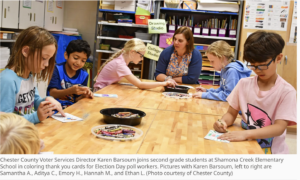 A Thank You to Poll Workers: The nearly 2,000 people who will serve as poll workers at Chester County, Pennsylvania’s 230 polling places will receive a special thank you this year. First, second and fourth graders at Downingtown Area School District’s Shamona Creek Elementary School have colored specially-designed notes to thank the poll workers. According to the Daily Local News, Chester County Voter Services Director Karen Barsoum and Chester County Commissioners’ Chair and Election Board Chair Josh Maxwell joined some of the second graders in Julie Dimino’s art class, to help color the cards and to thank the students for their contribution to the County’s election process. “Having the students color these notes of thanks will brighten the day of the thousands of poll workers who will be based at our precincts from early morning to late at night on Election Day,” said Barsoum. “Meeting with the students as they colored the cards also gave us the chance to share with them how important voting is in our country.” Shamona Creek Elementary School Art Teacher Julie Dimino said, “The students and I enjoyed showing our appreciation to our local volunteers. We wanted to illustrate our gratitude for all their volunteer efforts in the 2024 elections.”
A Thank You to Poll Workers: The nearly 2,000 people who will serve as poll workers at Chester County, Pennsylvania’s 230 polling places will receive a special thank you this year. First, second and fourth graders at Downingtown Area School District’s Shamona Creek Elementary School have colored specially-designed notes to thank the poll workers. According to the Daily Local News, Chester County Voter Services Director Karen Barsoum and Chester County Commissioners’ Chair and Election Board Chair Josh Maxwell joined some of the second graders in Julie Dimino’s art class, to help color the cards and to thank the students for their contribution to the County’s election process. “Having the students color these notes of thanks will brighten the day of the thousands of poll workers who will be based at our precincts from early morning to late at night on Election Day,” said Barsoum. “Meeting with the students as they colored the cards also gave us the chance to share with them how important voting is in our country.” Shamona Creek Elementary School Art Teacher Julie Dimino said, “The students and I enjoyed showing our appreciation to our local volunteers. We wanted to illustrate our gratitude for all their volunteer efforts in the 2024 elections.”
 A Historical Polling Place: For years, women in New York have flocked to the grave to Suffragette Susan B. Anthony, and placed their “I Voted” stickers on her headstone. The tradition grew so much that the cemetery had to place protective plexiglass over the headstone. Well this year, another part of Susan B. Anthony’s life (and death) will be part of the election process. From Oct. 26 to Nov. 3, the Susan B. Anthony Museum and House (SBA) will be holding early voting. Last April, ahead of the March presidential primaries, the SBA House opened its doors to early voters for the first time. According to President and CEO of the National Susan B. Anthony Museum and House, Deborah Hughes, the organization aims to share the story of Anthony’s fight for voting rights, and has wanted to become a voting site for a long time. “We thought it was really appropriate [to become a polling site], but things just opened up to make that possible recently. One is that we have early voting in New York state now.” The only space big enough on the museum’s campus was the carriage house, a larger space built in the ’90s to accommodate educational events in conjunction with the visitor center. It wasn’t until this winter that a second door was installed on the carriage house so that the space could become eligible as a polling place. “We had approached the Monroe County Board of Elections and said ‘We would really like to be a voting site, is that possible?’ They came and they had a whole set of criteria that they had to look at,” Hughes said. “And one of the pieces was you need to have two doors, just for safety and security.” The move to install the door had been in the works long before though, according to Hughes. However, it wasn’t until early voting became a serious possibility that the organization was able to expedite the project in time for the presidential primaries. According to Hughes, “everybody who shows up to vote, everybody who stands in line, no matter who they vote for, is a courageous person. And I just — I can’t imagine how much fun [it would be] to take that daring step right here.”
A Historical Polling Place: For years, women in New York have flocked to the grave to Suffragette Susan B. Anthony, and placed their “I Voted” stickers on her headstone. The tradition grew so much that the cemetery had to place protective plexiglass over the headstone. Well this year, another part of Susan B. Anthony’s life (and death) will be part of the election process. From Oct. 26 to Nov. 3, the Susan B. Anthony Museum and House (SBA) will be holding early voting. Last April, ahead of the March presidential primaries, the SBA House opened its doors to early voters for the first time. According to President and CEO of the National Susan B. Anthony Museum and House, Deborah Hughes, the organization aims to share the story of Anthony’s fight for voting rights, and has wanted to become a voting site for a long time. “We thought it was really appropriate [to become a polling site], but things just opened up to make that possible recently. One is that we have early voting in New York state now.” The only space big enough on the museum’s campus was the carriage house, a larger space built in the ’90s to accommodate educational events in conjunction with the visitor center. It wasn’t until this winter that a second door was installed on the carriage house so that the space could become eligible as a polling place. “We had approached the Monroe County Board of Elections and said ‘We would really like to be a voting site, is that possible?’ They came and they had a whole set of criteria that they had to look at,” Hughes said. “And one of the pieces was you need to have two doors, just for safety and security.” The move to install the door had been in the works long before though, according to Hughes. However, it wasn’t until early voting became a serious possibility that the organization was able to expedite the project in time for the presidential primaries. According to Hughes, “everybody who shows up to vote, everybody who stands in line, no matter who they vote for, is a courageous person. And I just — I can’t imagine how much fun [it would be] to take that daring step right here.”
 Podcast News: Lots of podcasts to listen to these days. The latest episode of Ballot Battleground Nevada takes a look at ranked choice voting. On Marketplace Tech, Verified Voting’s Pam Smith explains that the practice of hand counting has waned because of the disruptions and delays it imposes on the effort to determine election results. On the Democracy’s Future podcast at Illinois State University, ISU Center for Civic Engagement Director Katy Strzepek and McLean County Clerk Kathy Michael talk about voting in McLean County and on the campus of ISU. The NPR Politics Podcast takes a look at ranked choice voting and how that could reduce toxic partisanship. The Under the Radar podcast from WGBH takes a look at voting rights restoration for incarcerated Massachusetts residents. Kentucky Secretary of State Michael Adams recently joined the Voting Matters podcast. On the latest episode of NPR’s Trump Trials, host Scott Detrow speaks with NPR correspondent Miles Parks about the push to disqualify certain votes.
Podcast News: Lots of podcasts to listen to these days. The latest episode of Ballot Battleground Nevada takes a look at ranked choice voting. On Marketplace Tech, Verified Voting’s Pam Smith explains that the practice of hand counting has waned because of the disruptions and delays it imposes on the effort to determine election results. On the Democracy’s Future podcast at Illinois State University, ISU Center for Civic Engagement Director Katy Strzepek and McLean County Clerk Kathy Michael talk about voting in McLean County and on the campus of ISU. The NPR Politics Podcast takes a look at ranked choice voting and how that could reduce toxic partisanship. The Under the Radar podcast from WGBH takes a look at voting rights restoration for incarcerated Massachusetts residents. Kentucky Secretary of State Michael Adams recently joined the Voting Matters podcast. On the latest episode of NPR’s Trump Trials, host Scott Detrow speaks with NPR correspondent Miles Parks about the push to disqualify certain votes.
 Sticker News: Before we get to this week’s stickers, Teen Vogue has a look at the history of the “I Voted” sticker and how it’s gained in popularity through the years. “I Voted” stickers in Sandwich, Massachusetts will get a facelift just in time for Election Day. With 210 total entries, town staff selected three designs as the winners of the “I Voted” sticker contest, a
Sticker News: Before we get to this week’s stickers, Teen Vogue has a look at the history of the “I Voted” sticker and how it’s gained in popularity through the years. “I Voted” stickers in Sandwich, Massachusetts will get a facelift just in time for Election Day. With 210 total entries, town staff selected three designs as the winners of the “I Voted” sticker contest, a 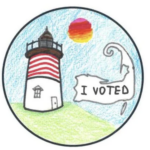 contest held earlier this year in which the town’s students were invited to create an updated design for the stickers. The winners are Oak Ridge student Caroline C. and high school students Hannah P. and Vladyslav H. Town Clerk Taylor D. White said that town staff were “blown away” by the talent demonstrated in the submissions, making the selection process difficult. He said that the designs were displayed on tables at town hall and “in a true democratic process,” town staff voted for their favorite designs. “It was a
contest held earlier this year in which the town’s students were invited to create an updated design for the stickers. The winners are Oak Ridge student Caroline C. and high school students Hannah P. and Vladyslav H. Town Clerk Taylor D. White said that town staff were “blown away” by the talent demonstrated in the submissions, making the selection process difficult. He said that the designs were displayed on tables at town hall and “in a true democratic process,” town staff voted for their favorite designs. “It was a 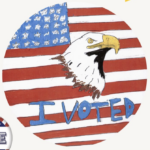 wonderful contest, and we hope to do it again for some future elections down the road,” he said. And congratulations to Claire M. for winning the Porter County, Indiana “I Voted” sticker contest. Like Louisiana, which chose to go with an artist for their “I Voted” stickers, Westbrook, Maine enlisted the services of local artist Flyn Costello to design this year’s sticker featuring a raccoon holding a Westbrook ballot. On social media, the clerk’s office boasted that “Westbrook voters are guaranteed to be the coolest voters in Maine while sporting these fantastic stickers!”
wonderful contest, and we hope to do it again for some future elections down the road,” he said. And congratulations to Claire M. for winning the Porter County, Indiana “I Voted” sticker contest. Like Louisiana, which chose to go with an artist for their “I Voted” stickers, Westbrook, Maine enlisted the services of local artist Flyn Costello to design this year’s sticker featuring a raccoon holding a Westbrook ballot. On social media, the clerk’s office boasted that “Westbrook voters are guaranteed to be the coolest voters in Maine while sporting these fantastic stickers!” 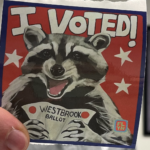 We’re gonna have to agree with them on this one. Kayla Jones, a Blenheim Middle School of Discovery student, has created this year’s Marlboro County, South Carolina “I Voted” sticker. “We are incredibly proud of Kayla and all the students who participated in this contest,” said Dr. Helena Tillar, Superintendent of Marlboro County School District. “This was a wonderful opportunity for our students to engage with the electoral process and express their artistic talents.”
We’re gonna have to agree with them on this one. Kayla Jones, a Blenheim Middle School of Discovery student, has created this year’s Marlboro County, South Carolina “I Voted” sticker. “We are incredibly proud of Kayla and all the students who participated in this contest,” said Dr. Helena Tillar, Superintendent of Marlboro County School District. “This was a wonderful opportunity for our students to engage with the electoral process and express their artistic talents.”
Personnel News: Christy Myers is the new Rockwell County, Texas deputy elections administrator. Glenn Johnson has been sworn in as the new chair of the Cherokee County, Georgia board of elections. Matthew Nicklas is no longer the Pickaway County, Ohio board of elections director. Ameika Banks has resigned as the Henry County, Georgia elections director.
New Research and Resources
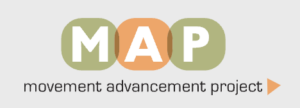 Post-Election Report: The Movement Advancement Project (MAP) released a new report, Beyond the Ballot: Understanding Post-Election Processes in America. The report explains the critical processes that take place after voting ends that help to protect the accuracy, integrity and security of our election system. In a time where voter confidence is suffering and election denialism is surging, it’s important that voters understand how their vote is counted, why results take time, and how results are verified and finalized. In addition, this report seeks to help voters resist further partisan divides and potential misinformation as we look ahead to the November 2024 elections. Although they play an important role in protecting the security and accuracy of our elections, post-election processes are much less understood than the policies and requirements for casting a vote. This new report outlines the steps that occur beginning Election Day to make sure that election results are verified, accurate, and secure. Using MAP’s Democracy Maps, which track dozens of election-related policies, this report illustrates how state laws vary on important points of post-election processes—such as ballot pre-processing, post-election audits, and the certification process. The report also details why these differences lead to certain predictable outcomes, such as some states taking longer than others to release their final election results.
Post-Election Report: The Movement Advancement Project (MAP) released a new report, Beyond the Ballot: Understanding Post-Election Processes in America. The report explains the critical processes that take place after voting ends that help to protect the accuracy, integrity and security of our election system. In a time where voter confidence is suffering and election denialism is surging, it’s important that voters understand how their vote is counted, why results take time, and how results are verified and finalized. In addition, this report seeks to help voters resist further partisan divides and potential misinformation as we look ahead to the November 2024 elections. Although they play an important role in protecting the security and accuracy of our elections, post-election processes are much less understood than the policies and requirements for casting a vote. This new report outlines the steps that occur beginning Election Day to make sure that election results are verified, accurate, and secure. Using MAP’s Democracy Maps, which track dozens of election-related policies, this report illustrates how state laws vary on important points of post-election processes—such as ballot pre-processing, post-election audits, and the certification process. The report also details why these differences lead to certain predictable outcomes, such as some states taking longer than others to release their final election results.
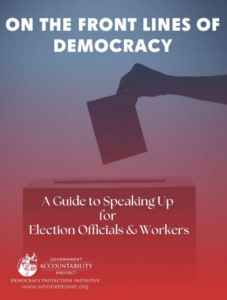 Guidance for Election Officials & Workers: The Government Accountability Project, a nonprofit, non-partisan law organization that provides legal and advocacy support to public interest whistleblowers. The group, which aims to empower and protect election officials and workers and others in the best position to discover illegal election interference or threats to a peaceful transfer of power by providing Know Your Rights education as well as expert legal counsel to ensure that potential whistleblowers are protected, recently developed—a Guide to Speaking Up for Election Officials & Workers—aimed at ensuring that election officials and workers understand their legal rights and protections to report wrongdoing that threatens election administration. It supports election workers in upholding democracy, even under pressure. The booklet version can be found here. The guide explains what whistleblowing is in the context of elections, state-specific info for Arizona, Georgia, Michigan, Nevada, North Carolina, Pennsylvania, Texas and Wisconsin (covering both statutory protections and common law exceptions to at-will employment), and best practices for reporting concerns safely and effectively, along with additional resources for election officials and workers who have concerns about election interference.
Guidance for Election Officials & Workers: The Government Accountability Project, a nonprofit, non-partisan law organization that provides legal and advocacy support to public interest whistleblowers. The group, which aims to empower and protect election officials and workers and others in the best position to discover illegal election interference or threats to a peaceful transfer of power by providing Know Your Rights education as well as expert legal counsel to ensure that potential whistleblowers are protected, recently developed—a Guide to Speaking Up for Election Officials & Workers—aimed at ensuring that election officials and workers understand their legal rights and protections to report wrongdoing that threatens election administration. It supports election workers in upholding democracy, even under pressure. The booklet version can be found here. The guide explains what whistleblowing is in the context of elections, state-specific info for Arizona, Georgia, Michigan, Nevada, North Carolina, Pennsylvania, Texas and Wisconsin (covering both statutory protections and common law exceptions to at-will employment), and best practices for reporting concerns safely and effectively, along with additional resources for election officials and workers who have concerns about election interference.
 Incident Response Guide: The Cybersecurity and Infrastructure Security Agency (CISA) and the U.S. Election Assistance Commission (EAC) released the Election Infrastructure Incident Response Communications Guide. This guide helps election officials build their own election infrastructure
Incident Response Guide: The Cybersecurity and Infrastructure Security Agency (CISA) and the U.S. Election Assistance Commission (EAC) released the Election Infrastructure Incident Response Communications Guide. This guide helps election officials build their own election infrastructure 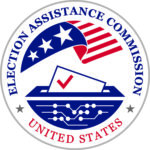 incident communications playbook before an incident occurs. It includes the core components of an incident response playbook and outlines the key steps election offices can take to communicate effectively during an incident. The guide also includes customizable templates with instructions and considerations for effective communication, maintaining transparency, and ensuring accurate and timely updates during an election incident. To learn more, visit the Election Infrastructure Incident Response Communications Guide on CISA.gov. For more information or to seek additional help, please contact EISRMA@cisa.dhs.gov.
incident communications playbook before an incident occurs. It includes the core components of an incident response playbook and outlines the key steps election offices can take to communicate effectively during an incident. The guide also includes customizable templates with instructions and considerations for effective communication, maintaining transparency, and ensuring accurate and timely updates during an election incident. To learn more, visit the Election Infrastructure Incident Response Communications Guide on CISA.gov. For more information or to seek additional help, please contact EISRMA@cisa.dhs.gov.
 Felon Voting Rights: Laws in 48 U.S. states ban people with felony convictions from voting. In 2024, an estimated 4 million Americans, representing 1.7% of the voting-age population, will be ineligible to vote due to these laws, many of which date back to the post-Reconstruction era. In this historic election year, questions persist about the stability of democratic institutions, election fairness, and voter suppression in marginalized communities. The systematic exclusion of millions with felony convictions should be front and center in these debates. This report from the Sentencing Project updates and expands upon a quarter century of work chronicling the scope and distribution of felony disenfranchisement in the United States.
Felon Voting Rights: Laws in 48 U.S. states ban people with felony convictions from voting. In 2024, an estimated 4 million Americans, representing 1.7% of the voting-age population, will be ineligible to vote due to these laws, many of which date back to the post-Reconstruction era. In this historic election year, questions persist about the stability of democratic institutions, election fairness, and voter suppression in marginalized communities. The systematic exclusion of millions with felony convictions should be front and center in these debates. This report from the Sentencing Project updates and expands upon a quarter century of work chronicling the scope and distribution of felony disenfranchisement in the United States.
Ballot Measures, Legislation & Rulemaking
 Luzerne County, Pennsylvania: The county council voted down a proposal this week that would have protected election workers. Councilwoman Joanna Bryn Smith proposed the election worker protection ordinance, saying it would provide an additional option for law enforcement to charge those accused of a range of alleged crimes against poll workers. Council Vice Chairman Brian Thornton said he condemns violence but spoke with county District Attorney Sam Sanguedolce and was informed the ordinance could be “inviting lawsuits” against the county because laws already exist at the state level. Thornton also read portions of an email from county Election Director Emily Cook, concluding the proposed ordinance is “ultimately a waste of time” because “there are no legitimate actionable offenses that were not already addressed as protections for these workers under the law.” Bryn Smith argued her ordinance is needed, particularly at a time when the county has placed boulders around the county’s Penn Place Building in downtown Wilkes-Barre for security purposes. Thornton suggested the council draft a resolution or proclamation condemning violence against election workers.
Luzerne County, Pennsylvania: The county council voted down a proposal this week that would have protected election workers. Councilwoman Joanna Bryn Smith proposed the election worker protection ordinance, saying it would provide an additional option for law enforcement to charge those accused of a range of alleged crimes against poll workers. Council Vice Chairman Brian Thornton said he condemns violence but spoke with county District Attorney Sam Sanguedolce and was informed the ordinance could be “inviting lawsuits” against the county because laws already exist at the state level. Thornton also read portions of an email from county Election Director Emily Cook, concluding the proposed ordinance is “ultimately a waste of time” because “there are no legitimate actionable offenses that were not already addressed as protections for these workers under the law.” Bryn Smith argued her ordinance is needed, particularly at a time when the county has placed boulders around the county’s Penn Place Building in downtown Wilkes-Barre for security purposes. Thornton suggested the council draft a resolution or proclamation condemning violence against election workers.
Legal Updates
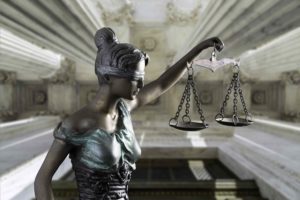 Federal Litigation: The U.S. Commodity Futures Trading Commission has asked a federal appeals court to expedite a hearing in a case that would determine if Americans can legally use derivatives contracts to bet on the outcomes of U.S. elections. The filing on the evening of October 2 came after the U.S. appeals court earlier that day blocked the CFTC’s effort to prohibit derivatives trading platform KalshiEX LLC from listing elections contracts, pending an appeal. A lower court had previously allowed Americans to place those bets. “The public’s interest lies with prompt disposition of this appeal,” the CFTC’s filing with the Court of Appeals for the D.C. Circuit read. The agency argued that election contracts are susceptible to market manipulation, and that the contracts could create the perception that the integrity of elections is at risk. “[This] would put the CFTC in the position of investigating such activities in election markets, well outside of its traditional areas of responsibility,” it said. The agency has asked the court for oral arguments in early December and noted that Kalshi has previously indicated it will oppose the effort to fast-track the appeal. In dismissing an earlier motion by the CFTC to pause the D.C. District Court’s order allowing Kalshi to list and trade election contracts, the appeals court said the regulator failed to show how the agency or the public interest would be harmed by Kalshi’s “event” contracts, as it had argued.
Federal Litigation: The U.S. Commodity Futures Trading Commission has asked a federal appeals court to expedite a hearing in a case that would determine if Americans can legally use derivatives contracts to bet on the outcomes of U.S. elections. The filing on the evening of October 2 came after the U.S. appeals court earlier that day blocked the CFTC’s effort to prohibit derivatives trading platform KalshiEX LLC from listing elections contracts, pending an appeal. A lower court had previously allowed Americans to place those bets. “The public’s interest lies with prompt disposition of this appeal,” the CFTC’s filing with the Court of Appeals for the D.C. Circuit read. The agency argued that election contracts are susceptible to market manipulation, and that the contracts could create the perception that the integrity of elections is at risk. “[This] would put the CFTC in the position of investigating such activities in election markets, well outside of its traditional areas of responsibility,” it said. The agency has asked the court for oral arguments in early December and noted that Kalshi has previously indicated it will oppose the effort to fast-track the appeal. In dismissing an earlier motion by the CFTC to pause the D.C. District Court’s order allowing Kalshi to list and trade election contracts, the appeals court said the regulator failed to show how the agency or the public interest would be harmed by Kalshi’s “event” contracts, as it had argued.
 Alabama: U.S. District Judge R. David Proctor rejected a state request to delay a ruling limiting the scope of a new state law criminalizing some forms of assistance with absentee ballots. In a 10-page filing, Proctor wrote that his Sept. 24 ruling — applied to the ability of blind, disabled and illiterate voters to choose people to assist them with applying for absentee voting — reflected the federal Voting Rights Act and took issue with the Alabama attorney general’s office’s characterization of his decision. “In reading Defendant’s Motion, one would think the court has enjoined Defendant from enforcing the entirety of Alabama Senate Bill 1 (‘SB 1’),” he wrote. “To the contrary, the court entered a limited injunction, which prohibits enforcement of SB 1 only to the extent that law is preempted by Section 208 of the Voting Rights Act (‘VRA’). Particularly in light of the tone of Defendant’s Motion, it is appropriate to put the court’s limited injunction into perspective.” Proctor’s rejection comes after the attorney general’s office filed a request October 2 that a court not issue a preliminary injunction in a lawsuit over the state’s efforts to remove some voters from the voter roll. In the 32-page filing, the state wrote that the plaintiffs challenging the removal misunderstood Secretary of State Wes Allen’s August news release to read it as proposing a systematic and untimely voter purge that targets naturalized citizens. “They were just wrong about the nature of the process, which they said would ‘immediately inactivate … and remove’ thousands of naturalized citizens,” they wrote. “…There’s a world of difference between that accusation and the reality hidden by the ellipsis: Secretary Allen instructed registrars to ‘inactivate and initiate steps necessary to remove all individuals who are not United States Citizens.”
Alabama: U.S. District Judge R. David Proctor rejected a state request to delay a ruling limiting the scope of a new state law criminalizing some forms of assistance with absentee ballots. In a 10-page filing, Proctor wrote that his Sept. 24 ruling — applied to the ability of blind, disabled and illiterate voters to choose people to assist them with applying for absentee voting — reflected the federal Voting Rights Act and took issue with the Alabama attorney general’s office’s characterization of his decision. “In reading Defendant’s Motion, one would think the court has enjoined Defendant from enforcing the entirety of Alabama Senate Bill 1 (‘SB 1’),” he wrote. “To the contrary, the court entered a limited injunction, which prohibits enforcement of SB 1 only to the extent that law is preempted by Section 208 of the Voting Rights Act (‘VRA’). Particularly in light of the tone of Defendant’s Motion, it is appropriate to put the court’s limited injunction into perspective.” Proctor’s rejection comes after the attorney general’s office filed a request October 2 that a court not issue a preliminary injunction in a lawsuit over the state’s efforts to remove some voters from the voter roll. In the 32-page filing, the state wrote that the plaintiffs challenging the removal misunderstood Secretary of State Wes Allen’s August news release to read it as proposing a systematic and untimely voter purge that targets naturalized citizens. “They were just wrong about the nature of the process, which they said would ‘immediately inactivate … and remove’ thousands of naturalized citizens,” they wrote. “…There’s a world of difference between that accusation and the reality hidden by the ellipsis: Secretary Allen instructed registrars to ‘inactivate and initiate steps necessary to remove all individuals who are not United States Citizens.”
 Arizona: A conservative group run by one of former President Donald Trump’s top legal aides is suing Arizona Secretary of State Adrian Fontes for withholding the names of the 218,000 voters who have been improperly registered to vote because of a glitch in the state’s driver’s license database.vThe decades-long glitch, which was first discovered last month, resulted in some Arizonans who had gotten a driver’s license before 1996 being inaccurately labeled as having provided proof of citizenship, which is a requirement to register to vote in the Grand Canyon State. The error in the database used by the state’s Motor Vehicles Division affects people with pre-1996 licenses who had received replacements. They had been registered to vote for decades, but were never asked to prove their citizenship because of the “data coding oversight” in the system. America First Legal and Jennifer Wright, the former head of the Arizona attorney general’s Election Integrity Unit, filed the lawsuit on behalf of Strong Communities Foundation of Arizona, a nonprofit led by conservative activist Merissa Hamilton. According to the lawsuit, Hamilton’s group filed a records request after news of the issue broke seeking “a subset of the Statewide Voter Registration Database (VRDB) that contains only those registered (active and inactive) voters that” were part of the data glitch. A few days later, the Secretary of State’s Office responded saying that the records “will be made available for inspection at the soonest available time and to the extent the law allows access. But no access will occur before the 2024 General Election.” Fontes’ office said that releasing that information now “would create confusion, chaos, uncertainty and consternation among the public — all of which is avoidable, and indeed must be avoided amid an ongoing election during which we expect to receive record turnout.” The group is suing to make those records available before early voting begins on Oct. 9. “We are suing the state of Arizona for refusing to provide the list of 218,000 voters who failed or refused to establish citizenship. It is absolutely imperative that we stop the dire threat of illegal alien voting, which is the gravest form of foreign election interference,” Miller said in a press release about the lawsuit.
Arizona: A conservative group run by one of former President Donald Trump’s top legal aides is suing Arizona Secretary of State Adrian Fontes for withholding the names of the 218,000 voters who have been improperly registered to vote because of a glitch in the state’s driver’s license database.vThe decades-long glitch, which was first discovered last month, resulted in some Arizonans who had gotten a driver’s license before 1996 being inaccurately labeled as having provided proof of citizenship, which is a requirement to register to vote in the Grand Canyon State. The error in the database used by the state’s Motor Vehicles Division affects people with pre-1996 licenses who had received replacements. They had been registered to vote for decades, but were never asked to prove their citizenship because of the “data coding oversight” in the system. America First Legal and Jennifer Wright, the former head of the Arizona attorney general’s Election Integrity Unit, filed the lawsuit on behalf of Strong Communities Foundation of Arizona, a nonprofit led by conservative activist Merissa Hamilton. According to the lawsuit, Hamilton’s group filed a records request after news of the issue broke seeking “a subset of the Statewide Voter Registration Database (VRDB) that contains only those registered (active and inactive) voters that” were part of the data glitch. A few days later, the Secretary of State’s Office responded saying that the records “will be made available for inspection at the soonest available time and to the extent the law allows access. But no access will occur before the 2024 General Election.” Fontes’ office said that releasing that information now “would create confusion, chaos, uncertainty and consternation among the public — all of which is avoidable, and indeed must be avoided amid an ongoing election during which we expect to receive record turnout.” The group is suing to make those records available before early voting begins on Oct. 9. “We are suing the state of Arizona for refusing to provide the list of 218,000 voters who failed or refused to establish citizenship. It is absolutely imperative that we stop the dire threat of illegal alien voting, which is the gravest form of foreign election interference,” Miller said in a press release about the lawsuit.
The Arizona Supreme Court ruled on Friday, affirming the Sept. 19 decision of a trial court that backers of Proposition 140 had gathered enough signatures to put the measure on the ballot, and that even if they hadn’t, the court could not legally order election officials to disregard votes for it. The ballot measure, known as the Make Arizona Elections Fair Act, would allow all registered voters to choose from all the candidates in the primary, regardless of their party affiliation, and the top vote-getters would advance to the general election, even if they don’t represent different parties. The goal of the campaign is to eliminate extreme partisan influence in elections. Opponents of the measure, including the Arizona Free Enterprise Club, challenged it in court, claiming that the campaign had gathered too many duplicate signatures, putting it beneath the threshold to make it on the ballot.
 Arkansas: The 8th U.S. Circuit Court of Appeals has issued a “stay pending appeal” of an Arkansas case involving a rule requiring an ink-on-paper signature on voter registration forms. The Appeals Court in September issued an administrative stay that allowed state officials to implement the “wet signature” rule while parties in a lawsuit over the regulation prepared court filings. On October 3, the appeals court converted the administrative stay into a stronger delay to give state officials time to prepare their appeal of a federal district judge’s preliminary injunction against the rule that limits the use of electronic signatures on voter registration forms.
Arkansas: The 8th U.S. Circuit Court of Appeals has issued a “stay pending appeal” of an Arkansas case involving a rule requiring an ink-on-paper signature on voter registration forms. The Appeals Court in September issued an administrative stay that allowed state officials to implement the “wet signature” rule while parties in a lawsuit over the regulation prepared court filings. On October 3, the appeals court converted the administrative stay into a stronger delay to give state officials time to prepare their appeal of a federal district judge’s preliminary injunction against the rule that limits the use of electronic signatures on voter registration forms.
Crittenden County election officials appealed to the Arkansas Supreme Court a circuit court order that required staffing an early voting location in West Memphis. The county Board of Election Commissioners voted 2-1 to appeal Circuit Court Judge Chris Thyer’s ruling that they should conduct early voting at one of three contested sites in West Memphis. He also asked attorneys on both sides to file an appeal so the high court could offer clarity on early voting statutory construction. Plaintiffs’ attorney Jennifer Standerfer said her clients were satisfied with at least one early voting location and would not take the case higher, but Republican election commissioners Frank Barton and Anita Bell voted to appeal Thyer’s order; Democratic member James Pulliaum voted against it. The appeal was filed Friday on behalf of the board by attorney Joe Rogers. The appeal only challenges the decision regarding early voting at Seventh Street Church of Christ in West Memphis, which Thyer found County Clerk Paula Brown appropriately designated under her authority.
 Colorado: District Judge Matthew Barrett sentenced former Mesa County Clerk Tina Peters nine years in prison for a data-breach scheme spawned from the rampant false claims about voting machine fraud in the 2020 presidential race. “I am convinced you would do it all over again if you could. You’re as defiant as any defendant this court has ever seen,” Barrett told her in handing down the sentence. “You are no hero. You abused your position and you’re a charlatan.” Jurors found Peters guilty in August for allowing a man to misuse a security card to access to the Mesa County election system and for being deceptive about that person’s identity. Before being sentenced, Peters insisted that everything she did to try to unroot what she believed was fraud was for the greater good. “I’ve never done anything with malice to break the law. I’ve only wanted to serve the people of Mesa County,” she told the court. “I’ve let you go on enough about this,” Judge Barrett said. “The votes are the votes.” Later, the judge noted that Peters has kept up public appearances in broadcasts to sympathetic audiences for her own benefit. “It’s just more lies. No objective person believes them. No, at the end of the day, you cared about the jets, the podcasts and people fawning over you,” Barrett said.
Colorado: District Judge Matthew Barrett sentenced former Mesa County Clerk Tina Peters nine years in prison for a data-breach scheme spawned from the rampant false claims about voting machine fraud in the 2020 presidential race. “I am convinced you would do it all over again if you could. You’re as defiant as any defendant this court has ever seen,” Barrett told her in handing down the sentence. “You are no hero. You abused your position and you’re a charlatan.” Jurors found Peters guilty in August for allowing a man to misuse a security card to access to the Mesa County election system and for being deceptive about that person’s identity. Before being sentenced, Peters insisted that everything she did to try to unroot what she believed was fraud was for the greater good. “I’ve never done anything with malice to break the law. I’ve only wanted to serve the people of Mesa County,” she told the court. “I’ve let you go on enough about this,” Judge Barrett said. “The votes are the votes.” Later, the judge noted that Peters has kept up public appearances in broadcasts to sympathetic audiences for her own benefit. “It’s just more lies. No objective person believes them. No, at the end of the day, you cared about the jets, the podcasts and people fawning over you,” Barrett said.
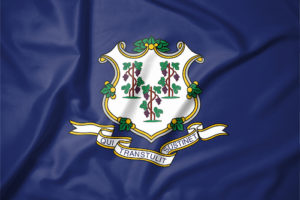 Connecticut: The Connecticut Supreme Court unanimously rejected a case filed by three Bridgeport voters seeking to force the arrests of two local political figures they accuse of election-law violations during last year’s Democratic mayoral primary in Bridgeport. The voters — Diahann Phillips, Alison Scofield and Albert Bottone — sought the arrests of Wanda Geter-Pataky, deputy head of the city’s Democratic Town Committee, and City Councilwoman Eneida Martinez based on accusations that they illegally had put absentee ballots in drop boxes to be counted. The three voters sought to challenge those conclusions through a legal mechanism known as a “writ of error,” which they filed with the state Appellate Court and the Supreme Court then transferred to its own docket. The Supreme Court did not consider the validity of Welch’s legal conclusions. Rather, it ruled that the three voters were not “aggrieved” by the judge’s denial of the arrest warrants “because they do not have a specific, personal, and legal interest in the arrest of those who allegedly violate election law,” according to the decision, written by Justice Gregory T. D’Auria. He quoted a past state Supreme Court decision explaining that such a personal legal interest is different from “a general interest that all members of the community share.”
Connecticut: The Connecticut Supreme Court unanimously rejected a case filed by three Bridgeport voters seeking to force the arrests of two local political figures they accuse of election-law violations during last year’s Democratic mayoral primary in Bridgeport. The voters — Diahann Phillips, Alison Scofield and Albert Bottone — sought the arrests of Wanda Geter-Pataky, deputy head of the city’s Democratic Town Committee, and City Councilwoman Eneida Martinez based on accusations that they illegally had put absentee ballots in drop boxes to be counted. The three voters sought to challenge those conclusions through a legal mechanism known as a “writ of error,” which they filed with the state Appellate Court and the Supreme Court then transferred to its own docket. The Supreme Court did not consider the validity of Welch’s legal conclusions. Rather, it ruled that the three voters were not “aggrieved” by the judge’s denial of the arrest warrants “because they do not have a specific, personal, and legal interest in the arrest of those who allegedly violate election law,” according to the decision, written by Justice Gregory T. D’Auria. He quoted a past state Supreme Court decision explaining that such a personal legal interest is different from “a general interest that all members of the community share.”
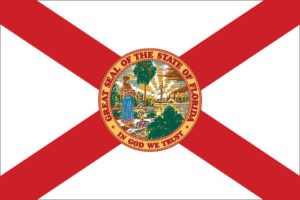 Florida: U.S. District Judge Robert Hinkle refused to extend the deadline to register to vote on Wednesday as Floridians braced for Hurricane Milton’s landfall while still grappling with Hurricane Helene’s aftermath. Hinkle that said allowing people to register to vote for the November election beyond Oct. 7 would overload supervisors of elections as they prepare for what could be “the most closely watched election.” The Florida chapters of the League of Women Voters and the NAACP wanted the court to order Gov. Ron DeSantis to reopen the voter registration process for at least 10 more days. The groups argued that Floridians obeying mandatory evacuation orders on Monday shouldn’t have to choose between their safety and their right to vote. DeSantis on Monday declined to extend the deadline because the hurricane hadn’t hit yet. Hinkle didn’t buy that argument, saying during the Wednesday afternoon emergency hearing in Tallahassee that people could have registered to vote online. “I hope it didn’t come off as insensitive. … If they had evacuated, they still could have registered while evacuating,” Hinkle said, noting that he didn’t think the online registration form would take more than five to 10 minutes to fill out.
Florida: U.S. District Judge Robert Hinkle refused to extend the deadline to register to vote on Wednesday as Floridians braced for Hurricane Milton’s landfall while still grappling with Hurricane Helene’s aftermath. Hinkle that said allowing people to register to vote for the November election beyond Oct. 7 would overload supervisors of elections as they prepare for what could be “the most closely watched election.” The Florida chapters of the League of Women Voters and the NAACP wanted the court to order Gov. Ron DeSantis to reopen the voter registration process for at least 10 more days. The groups argued that Floridians obeying mandatory evacuation orders on Monday shouldn’t have to choose between their safety and their right to vote. DeSantis on Monday declined to extend the deadline because the hurricane hadn’t hit yet. Hinkle didn’t buy that argument, saying during the Wednesday afternoon emergency hearing in Tallahassee that people could have registered to vote online. “I hope it didn’t come off as insensitive. … If they had evacuated, they still could have registered while evacuating,” Hinkle said, noting that he didn’t think the online registration form would take more than five to 10 minutes to fill out.
 Georgia: Civil rights groups sued Georgia on Monday in an effort to extend the state’s voter registration deadline by a week to account for residents who may not have been able to register in the wake of Hurricane Helene, which wreaked havoc in the state leading up to the deadline. The lawsuit filed in federal court by a coalition of civil rights groups argues that Hurricane Helene made landfall just days before the start of a critical week-long stretch before the October 7 deadline, when registration in the state typically spikes, disrupting that final batch of registrations. The group’s attorneys claim that the “massive and widespread disruptions and devastation” caused by Helene in the state “likely prevented tens of thousands of Georgia residents from timely registering to vote because they lacked internet access, could not travel, lacked access to postal services, or had no operational county election office.” They are seeking to extend the deadline until next Monday.
Georgia: Civil rights groups sued Georgia on Monday in an effort to extend the state’s voter registration deadline by a week to account for residents who may not have been able to register in the wake of Hurricane Helene, which wreaked havoc in the state leading up to the deadline. The lawsuit filed in federal court by a coalition of civil rights groups argues that Hurricane Helene made landfall just days before the start of a critical week-long stretch before the October 7 deadline, when registration in the state typically spikes, disrupting that final batch of registrations. The group’s attorneys claim that the “massive and widespread disruptions and devastation” caused by Helene in the state “likely prevented tens of thousands of Georgia residents from timely registering to vote because they lacked internet access, could not travel, lacked access to postal services, or had no operational county election office.” They are seeking to extend the deadline until next Monday.
Fulton County Superior Court Judge Scott McAfee threw out a case that claimed Georgia’s voting system was made vulnerable by the public disclosure of security features and computer code. McAfee dismissed the case because Secretary of State Brad Raffensperger complied with state law when he certified the Dominion voting system as “safe and practicable” before it went into use in 2020. “Although applicant may firmly believe that the secretary’s current processes are ‘nonsensical’ and ‘appalling,’ and good-faith concerns over how to better secure our elections should be taken seriously, this matter is currently one that must be deferred to the policymaking branches,” McAfee wrote in the dismissal. The GOP lawsuit argued that the encryption keys that protect passwords and other information for voting machines were revealed within election databases released by four Georgia counties in response to records requests. The Republican Party alleged that the Dominion voting system doesn’t meet federal standards and asked McAfee to order Raffensperger to take steps to meet those standards. Attorneys for the secretary of state’s office said the voting system has been certified both by the federal government and by Raffensperger himself.
The Cobb County Board of Elections has sued the Georgia State Election Board, challenging six of its recently passed rules. The suit, filed in the Fulton County Superior Court, seeks judgment on whether or not the half-dozen rules are within the State Election Board’s authority and/or are “unreasonable.” “The SEB’s Sept. 20 rules lack statutory authorization, conflict with and improperly expand provisions of the Election Code, impermissibly intrude on the exclusive authority of the Secretary of State and county superintendents, and neither promote uniformity nor are conducive to the fair, legal, and orderly conduct of elections,” the filing reads. “… The rules therefore exceed the SEB’s statutory authority and should be declared invalid.” The rules challenged by the Cobb Elections Board were passed by the State Election Board on Sept. 20 — less than two months from Election Day.
The Muscogee County Board of Elections and Registrations also filed a lawsuit in Superior Court to block the implementation of a new rule put in place by the Georgia State Election Board. The rule the Muscogee County Board opposes is the “Hand Count” rule. The rule states that after the polling place closes, and all votes have been cast, three sworn precinct polling officers will independently count the number of votes cast in each ballot box. They will not tabulate the vote totals for each candidate. The Muscogee County board alleges the new voting rule implemented by the state board contradicts Georgia law, leaving the board in a state of legal uncertainty saying, “Compliance with the Hand Counting Rule runs contrary to O.C.G.A ss 21-2-420, which requires that after completing the required accounting and related documentation for a precinct, ‘the poll manager and at least one assistance manager shall… immediately deliver all required documentation and election materials to the election superintendent.’” In addition to claiming the rule contradicts Georgia law, the Muscogee Board says hand counting the ballots would delay election results and increase voter distrust. “Hand-counting also introduces more possibilities for human error, which creates opportunities for misinformation about the certainty of election results,” the petition reads. The Muscogee County Board also claims the Hand Count Rule would cause unnecessary expenditures as it would require new training for poll workers and require those workers to do more work.
The Republican National Committee — along with the Georgia Republican Party and Fulton County Republican Party — filed a lawsuit accusing Fulton County, Georgia election officials of not hiring enough Republican poll workers for the upcoming election. According to the lawsuit, which names Nadine Williams— the Director of Fulton County Department of Registration and Elections — as the defendant, only nine of 45 qualified Republican poll workers were allegedly hired to work during the early voting period. And only six out of 62 qualified Republican poll workers were hired to work on Election Day. The lawsuit also alleges that Williams violated state law by not directly hiring poll workers from a list of qualified candidates submitted to her, instead delegating the duty to temp agencies and the managers of individual polling locations. The lawsuit asks the court to order Williams to hire Republican poll workers from the lists provided to her, or submit written statements to each poll worker on the list explaining why they can’t be hired.
 Michigan: Four St. Clair Shores voters who allegedly cast two separate ballots in the August primary are facing felony charges. The alleged double voting was the result of voters casting both absentee and in-person ballots during the primary on Aug. 6. It was caught shortly afterward by voting officials and investigated by local police before Macomb County prosecutor Peter Lucido ultimately declined to prosecute. But Attorney General Dana Nessel announced felony charges against those voters, as well as three St. Clair Shores assistant clerks, after her office conducted another investigation into the double votes. The four voters are accused of two separate felonies: one count of voting absentee and in person, and one count of offering to vote more than once. The combined maximum penalty for those violations is nine years in prison. Three assistant clerks also face felony charges. Patricia Guciardo and Emily McClintock are both charged with the same felonies as the voters, as well as an additional count of falsifying election returns or records, which has a maximum sentence of five years. The third, Molly Brasure, faces two counts of falsifying election records and two counts each of voting absentee and in person, and offering to vote more than once.
Michigan: Four St. Clair Shores voters who allegedly cast two separate ballots in the August primary are facing felony charges. The alleged double voting was the result of voters casting both absentee and in-person ballots during the primary on Aug. 6. It was caught shortly afterward by voting officials and investigated by local police before Macomb County prosecutor Peter Lucido ultimately declined to prosecute. But Attorney General Dana Nessel announced felony charges against those voters, as well as three St. Clair Shores assistant clerks, after her office conducted another investigation into the double votes. The four voters are accused of two separate felonies: one count of voting absentee and in person, and one count of offering to vote more than once. The combined maximum penalty for those violations is nine years in prison. Three assistant clerks also face felony charges. Patricia Guciardo and Emily McClintock are both charged with the same felonies as the voters, as well as an additional count of falsifying election returns or records, which has a maximum sentence of five years. The third, Molly Brasure, faces two counts of falsifying election records and two counts each of voting absentee and in person, and offering to vote more than once.
 Nevada: Democrats are seeking to dismiss a GOP lawsuit that alleged Nevada officials have failed to remove noncitizens from its voter rolls, calling them “recycled allegations” from four years ago based on “no actual evidence.” In a motion filed Friday on behalf of the Democratic National Committee and Nevada Democratic Party, a Carson City judge was asked to toss out the Republican lawsuit from mid-September. It argues the state already has a robust process for ensuring noncitizens do not vote (which is illegal nationwide) and accuses Republicans of seeking a “drastic change” in the home stretch of the election cycle that is not allowed under federal laws. The lawsuit, filed by former President Donald Trump’s campaign along with the Nevada GOP and Republican National Committee, accused state election officials of not adopting regulations to verify that people on the voter rolls are citizens and that the state has not systematically removed noncitizens from the voter rolls. It says this disadvantages Republicans, and calls for the judge to require officials to conduct systematic voter roll maintenance ahead of the November election. The lawsuit was the fourth filed by national Republican organizations this year in Nevada, and all other three have either been dismissed or denied but are in various stages of appeal. Republicans have said these lawsuits are necessary to bolster trust in elections, but Democrats argue the suits are destined to fail and are simply a ploy to diminish trust in elections.
Nevada: Democrats are seeking to dismiss a GOP lawsuit that alleged Nevada officials have failed to remove noncitizens from its voter rolls, calling them “recycled allegations” from four years ago based on “no actual evidence.” In a motion filed Friday on behalf of the Democratic National Committee and Nevada Democratic Party, a Carson City judge was asked to toss out the Republican lawsuit from mid-September. It argues the state already has a robust process for ensuring noncitizens do not vote (which is illegal nationwide) and accuses Republicans of seeking a “drastic change” in the home stretch of the election cycle that is not allowed under federal laws. The lawsuit, filed by former President Donald Trump’s campaign along with the Nevada GOP and Republican National Committee, accused state election officials of not adopting regulations to verify that people on the voter rolls are citizens and that the state has not systematically removed noncitizens from the voter rolls. It says this disadvantages Republicans, and calls for the judge to require officials to conduct systematic voter roll maintenance ahead of the November election. The lawsuit was the fourth filed by national Republican organizations this year in Nevada, and all other three have either been dismissed or denied but are in various stages of appeal. Republicans have said these lawsuits are necessary to bolster trust in elections, but Democrats argue the suits are destined to fail and are simply a ploy to diminish trust in elections.
 New Mexico: Santa Fe District Court Judge Kathleen McGarry Etlenwood has ordered two state agencies to work together to ensure roughly 11,000 formerly incarcerated New Mexicans can vote in next month’s election if they want. The order came in response to a lawsuit filed in late September alleging the voting rights of up to 11,000 individuals were in jeopardy this year, a violation of a 2023 law that allows people incarcerated on felony crimes to vote once they had been released, even if they are still on probation or parole. The order, issued by Etlenwood, also created a process by which the state’s 33 county clerks can confirm through a 24-hour hotline whether people convicted of felonies who’ve registered to vote online or through the mail are no longer behind bars.The New Mexico Corrections Department was not regularly communicating who was currently in its prisons to the Secretary of State, who in turn was forced “to rely on outdated and inaccurate information,” according to the lawsuit. The end result: the Secretary of State was improperly flagging individuals who were, according to the 2023 law, eligible to vote. The order provides a short-term fix, ensuring those New Mexicans potentially disenfranchised can vote in next month’s election, said Santa Fe attorney Daniel Yohalem, who along with Washington-based Campaign Legal Center and the group Millions for Prisoners New Mexico, sued the state.
New Mexico: Santa Fe District Court Judge Kathleen McGarry Etlenwood has ordered two state agencies to work together to ensure roughly 11,000 formerly incarcerated New Mexicans can vote in next month’s election if they want. The order came in response to a lawsuit filed in late September alleging the voting rights of up to 11,000 individuals were in jeopardy this year, a violation of a 2023 law that allows people incarcerated on felony crimes to vote once they had been released, even if they are still on probation or parole. The order, issued by Etlenwood, also created a process by which the state’s 33 county clerks can confirm through a 24-hour hotline whether people convicted of felonies who’ve registered to vote online or through the mail are no longer behind bars.The New Mexico Corrections Department was not regularly communicating who was currently in its prisons to the Secretary of State, who in turn was forced “to rely on outdated and inaccurate information,” according to the lawsuit. The end result: the Secretary of State was improperly flagging individuals who were, according to the 2023 law, eligible to vote. The order provides a short-term fix, ensuring those New Mexicans potentially disenfranchised can vote in next month’s election, said Santa Fe attorney Daniel Yohalem, who along with Washington-based Campaign Legal Center and the group Millions for Prisoners New Mexico, sued the state.
 New York: New York state Supreme Court Judge Gerard Neri ruled that the new state law that will move many local elections to line up with state and federal elections in even-numbered years violates the state Constitution. The judge sided with Republican-led challenges to the law arguing that it conflicts with individual county charters. Twenty New York counties are chartered, meaning they have locally drafted and approved laws outlining the structure and authority of county government, and there have been three separate amendments in the state Constitution allowing for and protecting counties’ abilities to govern through charters. At issue is a law passed by the Legislature and signed by Gov. Kathy Hochul in December 2023 that moves several local elections outside of New York City to even-numbered years starting in 2025, with the exception of some city or village elections, and races for county clerk, sheriff, district attorneys, local judges and others protected in the state Constitution. “The prerequisites of a special law were not followed and the subject matter of the Even Year Election Law is inherently a local issue as it affects no state offices. The Even Year Election Law is unconstitutional as specifically prohibited by Article IX of the New York State Constitution,” Judge Gerard Neri wrote in his ruling. Neri noted the fact that the law doesn’t apply to races like county clerk and sheriff would confuse voters. The judge also argued that maintaining the election schedule as it means that local interests would not have to compete for attention with more widely covered state and national issues. “Be it in the local paper, television, radio, online, or one’s mailbox, the competition for a voter’s attention is fierce. New York and the Plaintiff Counties are home to some of the most competitive House of Representative Races, and with that competition comes massive spending on advertising. There is simply no way local races can compete and obtain media attention, paid or earned, in that maelstrom,” Neri wrote.
New York: New York state Supreme Court Judge Gerard Neri ruled that the new state law that will move many local elections to line up with state and federal elections in even-numbered years violates the state Constitution. The judge sided with Republican-led challenges to the law arguing that it conflicts with individual county charters. Twenty New York counties are chartered, meaning they have locally drafted and approved laws outlining the structure and authority of county government, and there have been three separate amendments in the state Constitution allowing for and protecting counties’ abilities to govern through charters. At issue is a law passed by the Legislature and signed by Gov. Kathy Hochul in December 2023 that moves several local elections outside of New York City to even-numbered years starting in 2025, with the exception of some city or village elections, and races for county clerk, sheriff, district attorneys, local judges and others protected in the state Constitution. “The prerequisites of a special law were not followed and the subject matter of the Even Year Election Law is inherently a local issue as it affects no state offices. The Even Year Election Law is unconstitutional as specifically prohibited by Article IX of the New York State Constitution,” Judge Gerard Neri wrote in his ruling. Neri noted the fact that the law doesn’t apply to races like county clerk and sheriff would confuse voters. The judge also argued that maintaining the election schedule as it means that local interests would not have to compete for attention with more widely covered state and national issues. “Be it in the local paper, television, radio, online, or one’s mailbox, the competition for a voter’s attention is fierce. New York and the Plaintiff Counties are home to some of the most competitive House of Representative Races, and with that competition comes massive spending on advertising. There is simply no way local races can compete and obtain media attention, paid or earned, in that maelstrom,” Neri wrote.
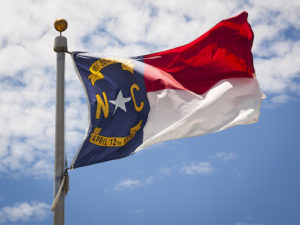 North Carolina: The Republican National Committee (RNC) filed a new lawsuit against the North Carolina State Election Board, alleging officials are illegally permitting overseas voters who don’t reside in the state to participate in its elections. The complaint filed by the RNC and North Carolina Republican Party takes issue with how the board is applying North Carolina’s Uniform Military and Overseas Voters Act (UMOVA), which allows for military members and U.S. citizens living abroad to vote in state and federal elections. The lawsuit alleges the state election board is incorrectly using state and federal law to extend voter qualifications to people living abroad who aren’t residents. It says the state election board’s guidance to county election officials advises that voters who never resided in North Carolina but are attempting to register to vote in the state are exempt from the HAVA requirement. Republicans are asking a state court to declare that the North Carolina election board’s application of the law conflicts with how the state constitution defines eligible voters and is therefore unconstitutional. They also want the court to void the guidance issued to clerks in September and block the board from accepting voter registration forms from individuals who don’t have the proper HAVA requirements. The plaintiffs want the election board to instruct county clerks to not process ballots returned by voters who never lived in the state.
North Carolina: The Republican National Committee (RNC) filed a new lawsuit against the North Carolina State Election Board, alleging officials are illegally permitting overseas voters who don’t reside in the state to participate in its elections. The complaint filed by the RNC and North Carolina Republican Party takes issue with how the board is applying North Carolina’s Uniform Military and Overseas Voters Act (UMOVA), which allows for military members and U.S. citizens living abroad to vote in state and federal elections. The lawsuit alleges the state election board is incorrectly using state and federal law to extend voter qualifications to people living abroad who aren’t residents. It says the state election board’s guidance to county election officials advises that voters who never resided in North Carolina but are attempting to register to vote in the state are exempt from the HAVA requirement. Republicans are asking a state court to declare that the North Carolina election board’s application of the law conflicts with how the state constitution defines eligible voters and is therefore unconstitutional. They also want the court to void the guidance issued to clerks in September and block the board from accepting voter registration forms from individuals who don’t have the proper HAVA requirements. The plaintiffs want the election board to instruct county clerks to not process ballots returned by voters who never lived in the state.
 Pennsylvania: In a pair of decisions published Saturday evening the Pennsylvania Supreme Court denied requests to resolve questions about the commonwealth’s vote-by-mail law in the final few weeks before the Nov. 5 presidential election. Dismissing a request by the voting rights groups to block the enforcement of a rule requiring mail-in ballots to bear a handwritten date on the return envelope, the Supreme Court said the risk of confusing voters with a change in voting rules was too great. “This Court will neither impose nor countenance substantial alterations to existing laws and procedures during the pendency of an ongoing election,” the unsigned order said. Chief Justice Debra Todd filed a dissenting statement in which she argued that voters and election officials need guidance in the upcoming election. “We ought to resolve this important constitutional question now, before ballots may be improperly rejected and voters disenfranchised,” Todd said. The court also rejected a request by the Republican National Committee and the Republican Party of Pennsylvania to stop county election officials from allowing voters to remedy mistakes on their mail-in ballots that would cause them to be disqualified.
Pennsylvania: In a pair of decisions published Saturday evening the Pennsylvania Supreme Court denied requests to resolve questions about the commonwealth’s vote-by-mail law in the final few weeks before the Nov. 5 presidential election. Dismissing a request by the voting rights groups to block the enforcement of a rule requiring mail-in ballots to bear a handwritten date on the return envelope, the Supreme Court said the risk of confusing voters with a change in voting rules was too great. “This Court will neither impose nor countenance substantial alterations to existing laws and procedures during the pendency of an ongoing election,” the unsigned order said. Chief Justice Debra Todd filed a dissenting statement in which she argued that voters and election officials need guidance in the upcoming election. “We ought to resolve this important constitutional question now, before ballots may be improperly rejected and voters disenfranchised,” Todd said. The court also rejected a request by the Republican National Committee and the Republican Party of Pennsylvania to stop county election officials from allowing voters to remedy mistakes on their mail-in ballots that would cause them to be disqualified.
In other state Supreme Court news, the court has agreed to hear a consolidated appeal of rulings in two Lycoming County cases over right-to-know requests that originated after the 2020 presidential election. The state’s highest court Monday also granted the request of the Republican National Committee (RNC) and the Pennsylvania Republican Party to file a friend of the court brief on behalf of the plaintiffs.
The U.S. Supreme Court said Monday it would not hear an appeal by members of the Pennsylvania Freedom Caucus in a challenge of Gov. Josh Shapiro’s order implementing automatic voter registration in the commonwealth. Members of the Freedom Caucus led by state Rep. Dawn Keefer (R-York) asked the court to intercede in the case before the Philadelphia-based U.S. 3rd Circuit Court of Appeals ruled in the case, which also challenged an executive order by President Joe Biden directing federal agencies to work with third-party organizations to improve ballot access across the country. The high court’s decision sets the stage for arguments before the 3rd Circuit in December, after the Nov. 5 presidential election, in a case that would clarify which branches of government have the power to make election law under the U.S. Constitution, attorney Erick G. Kaardal said.
The Republican National Committee’s request for a “petition for a special and preliminary injunction” against the Montgomery County Board of Elections has been withdrawn, according to a court order issued Monday. Attorneys were scheduled to appear at 9:30 a.m. Monday before Judge Richard Haaz inside the Montgomery County Courthouse in Norristown, but the hearing was canceled. Based on a series of stipulations reached between the parties to the suit, plaintiffs Republican National Committee, Montgomery County Republican Committee Chairman Christian Nascimento and Republican Senate candidate Dave McCormick withdrew the petition for a special and preliminary injunction, court documents state. The petitioners filed a civil complaint in court last month, accusing Montgomery County election officials of sending out mail-in ballots prior to wrapping up “logic and accuracy testing,” which is mandated by a Pennsylvania Department of State directive to ensure the functioning of equipment and systems ahead of an election.
 South Carolina: Circuit Court Judge Daniel Coble agreed to grant a motion for a temporary injunction and extend the state’s voter registration deadlines by 10 days as many residents still are without power and crews work to clear debris from roads and homes. Residents now have until Monday, Oct. 14 to register in person, online, fax and email or by mail to vote in the Nov. 5 election. The emergency hearing request was brought by the South Carolina Democratic Party late Thursday. The party was represented by Charleston attorney Richard Hricik. “Your honor, this is on behalf of all voters in South Carolina, and to ensure everyone has the right to vote,” Hricik said in a virtual hearing Friday morning. “We did not want to ask for a deadline that would unduly burden the state resources or otherwise.” Gov. Henry McMaster, state Attorney General Alan Wilson and S.C. House and Senate leaders were notified ahead of the hearing, the State Election Commission told Coble Friday. None of the parties voiced opposition to the request or took a position, they said.
South Carolina: Circuit Court Judge Daniel Coble agreed to grant a motion for a temporary injunction and extend the state’s voter registration deadlines by 10 days as many residents still are without power and crews work to clear debris from roads and homes. Residents now have until Monday, Oct. 14 to register in person, online, fax and email or by mail to vote in the Nov. 5 election. The emergency hearing request was brought by the South Carolina Democratic Party late Thursday. The party was represented by Charleston attorney Richard Hricik. “Your honor, this is on behalf of all voters in South Carolina, and to ensure everyone has the right to vote,” Hricik said in a virtual hearing Friday morning. “We did not want to ask for a deadline that would unduly burden the state resources or otherwise.” Gov. Henry McMaster, state Attorney General Alan Wilson and S.C. House and Senate leaders were notified ahead of the hearing, the State Election Commission told Coble Friday. None of the parties voiced opposition to the request or took a position, they said.
 Texas: Dallas County Judge Rachel Craig ordered an additional early voting site be established in Rowlett amid an intense battle between the city and Freedom Place Church. Craig granted a temporary restraining order and ordered the Rowlett Community Centre as an alternate early voting polling location. The community center has previously been a site for early voting in the city; however, this year, Freedom Place Church was selected. The petition was filed Tuesday morning by Kyle Pugh, with the law firm C. Kyle Pugh, PC, on behalf of Robert Margolis, Senior Citizens of Rowlett, Michael Britt and Barbara Britt “seeking to enforce the Texas Elections Code,” in regards to the voting location. “Rowlett Community Centre has an abundance of parking, they have an abundance of ADA compliant parking, they have greater infrastructure to accommodate the citizens of Rowlett when they vote in this critical election,” Pugh said Tuesday. Margolis previously told CBS News Texas he was worried about his resident’s access to the polls with the church being a smaller location with only 11 parking spaces.
Texas: Dallas County Judge Rachel Craig ordered an additional early voting site be established in Rowlett amid an intense battle between the city and Freedom Place Church. Craig granted a temporary restraining order and ordered the Rowlett Community Centre as an alternate early voting polling location. The community center has previously been a site for early voting in the city; however, this year, Freedom Place Church was selected. The petition was filed Tuesday morning by Kyle Pugh, with the law firm C. Kyle Pugh, PC, on behalf of Robert Margolis, Senior Citizens of Rowlett, Michael Britt and Barbara Britt “seeking to enforce the Texas Elections Code,” in regards to the voting location. “Rowlett Community Centre has an abundance of parking, they have an abundance of ADA compliant parking, they have greater infrastructure to accommodate the citizens of Rowlett when they vote in this critical election,” Pugh said Tuesday. Margolis previously told CBS News Texas he was worried about his resident’s access to the polls with the church being a smaller location with only 11 parking spaces.
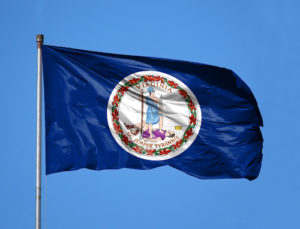 Virginia: The Virginia Coalition for Immigrant Rights and the League of Women Voters of Virginia filed a lawsuit in federal court challenging ” the state’s policy of illegally and systematically removing voters from the rolls.” According to a statement from the League of Women Voters, the policy regarding the removal of voters from the registration list is at the core of the lawsuit. The suit is in response to an August Executive Order from Gov. Glenn Youngkin signed in which he said increased election security by approving actions like “best-in-the-nation voter list maintenance.” Youngkin’s executive order required the Department of Elections to send a notice to individuals whose names could be removed from the roles, but that one notice isn’t enough, the statement says–especially since they say there is no requirement to confirm the accuracy of the DMV info the notice relies upon. “Individual voters have less than 14 days to respond to the notice in order to avoid removal — a burden that falls disproportionately on naturalized US citizens,” the League of Women Voters said.
Virginia: The Virginia Coalition for Immigrant Rights and the League of Women Voters of Virginia filed a lawsuit in federal court challenging ” the state’s policy of illegally and systematically removing voters from the rolls.” According to a statement from the League of Women Voters, the policy regarding the removal of voters from the registration list is at the core of the lawsuit. The suit is in response to an August Executive Order from Gov. Glenn Youngkin signed in which he said increased election security by approving actions like “best-in-the-nation voter list maintenance.” Youngkin’s executive order required the Department of Elections to send a notice to individuals whose names could be removed from the roles, but that one notice isn’t enough, the statement says–especially since they say there is no requirement to confirm the accuracy of the DMV info the notice relies upon. “Individual voters have less than 14 days to respond to the notice in order to avoid removal — a burden that falls disproportionately on naturalized US citizens,” the League of Women Voters said.
 Wisconsin: Chief U.S. District Judge James Peterson for Wisconsin’s Western District ordered the Rusk County Town of Thornapple to resume using electronic voting machines after the town’s board switched to hand-counting paper ballots in two elections this year. The order says the town violated federal law aimed at making voting easier for people with disabilities. The preliminary injunction states that the town’s clerk and three-member board of supervisors violated the Help America Vote Act, or HAVA, by failing to provide at least one “voting system equipped for individuals with disabilities” at its single polling place in the April 2 and Aug. 13 elections. According to court documents, the town’s former clerk Suzanne Pinnow cited “the controversial nature of electronic voting machines” during a June 2023 town board meeting as part of the justification for moving to hand-counted, paper ballots. Meeting minutes show she also claims that municipalities with “less than 7,000 voters” are “not required” to use the voting machines. The injunction stems from a joint agreement between U.S. investigators and Thornapple officials in which the town agreed to provide one electronic voting machine at the town’s sole polling place, and that the “voting system is, for the full period that the polling place is required to be open under Wisconsin State law, plugged into a functioning electrical outlet, turned on, and readily visible and accessible to voters.” The town has also agreed to not enforce its June 2023 resolution “to stop use of the electronic voting machine,” post signs alerting voters that the voting machine is available for use and allow representatives of the U.S. Department of Justice to ensure the court’s order is being followed during the Nov. 5 election.
Wisconsin: Chief U.S. District Judge James Peterson for Wisconsin’s Western District ordered the Rusk County Town of Thornapple to resume using electronic voting machines after the town’s board switched to hand-counting paper ballots in two elections this year. The order says the town violated federal law aimed at making voting easier for people with disabilities. The preliminary injunction states that the town’s clerk and three-member board of supervisors violated the Help America Vote Act, or HAVA, by failing to provide at least one “voting system equipped for individuals with disabilities” at its single polling place in the April 2 and Aug. 13 elections. According to court documents, the town’s former clerk Suzanne Pinnow cited “the controversial nature of electronic voting machines” during a June 2023 town board meeting as part of the justification for moving to hand-counted, paper ballots. Meeting minutes show she also claims that municipalities with “less than 7,000 voters” are “not required” to use the voting machines. The injunction stems from a joint agreement between U.S. investigators and Thornapple officials in which the town agreed to provide one electronic voting machine at the town’s sole polling place, and that the “voting system is, for the full period that the polling place is required to be open under Wisconsin State law, plugged into a functioning electrical outlet, turned on, and readily visible and accessible to voters.” The town has also agreed to not enforce its June 2023 resolution “to stop use of the electronic voting machine,” post signs alerting voters that the voting machine is available for use and allow representatives of the U.S. Department of Justice to ensure the court’s order is being followed during the Nov. 5 election.
Opinions This Week
National Opinions: Election officials, II | Ex-felon voting rights | Election emergencies | U.S. Postal Service | Hurricane Helene | Voter fraud, II | 2020 | Rigged elections; |Tina Peters | Rulemaking | Political violence
Alaska: Election security | Election reform ballot measure, II, III
Arizona: Ballot length
Colorado: Ranked choice voting | Tina Peters
Connecticut: Early voting | Absentee voting
District of Columbia: Ranked choice voting ballot measure
Florida: Hillsborough County
Georgia: Faith in elections
Idaho: Election security | Election reform ballot measure
Kansas: Shawnee County
Louisiana: Election security
Mississippi: Voting rights
North Carolina: Hurricane Helene, II
Ohio: Voter ID
Pennsylvania: Drop boxes | State Supreme Court
Rhode Island: Poll workers
Utah: Lieutenant governor
Wisconsin: Fair elections | Election officials
Upcoming Events
Democracy at a Crossroads: Governance Studies at the Brookings Institution and the Public Religion Research Institute will host an event for the release of the 15th annual American Values Survey. A panel of experts will discuss what the survey results reveal about the priorities of Americans in the 2024 election and beyond. Featuring: E. J. Dionne Jr., W. Averell Herriman Chair and Senior Fellow, Governance Studies, Brookings Institution; William Galston, Ezra K. Zilkha Chair and Senior Fellow, Governance Studies, Brookings Institution; Robert P. Jones, President and Founder, Public Religion Research Institute; Melissa Deckman, CEO, Public Religion Research Institute; Joy Reid, Host, The ReidOut; Political Analyst, MSNBC; and A. B. Stoddard, Columnist, The Bulwark. When: October 16, 10am Eastern. Where: Online and in-person at Brookings: 1775 Massachusetts Ave NW, Washington, D.C.
AI, Social Media, the Information Environment, and the 2024 Elections: As we prepare for another fall semester, we’re excited to bring you a robust series of events on the 2024 Elections, Election Law, and the risks facing democracy in the U.S. Co-sponsored by the Institute for Technology, Law & Policy, UCLA Law, this webinar will feature: Danielle Citron (University of Virginia Law School), Brendan Nyhan (Dartmouth), Nate Persily (Stanford Law School). When: October 21, 3:15 pm Eastern. Where: Online
Vote Early Day: Vote Early Day is a nonpartisan movement of media companies, businesses, nonprofits, election administrators, and creatives working to ensure all Americans have the tools to vote early. Vote Early Day was founded by MTV as a new civic holiday focused on helping every voter know how, where, and when they can vote early. Launched in the midst of a global pandemic, Vote Early Day became a critical resource to ensure no voter had to choose between their health and casting their ballot. In its first celebration, Vote Early Day attracted 134 premier partners and 2,700 general partners from every state in the nation. Over 3,000,000 voters cast their ballots on Vote Early Day alone. When: October 29. Where: In states that allow early voting
Election Hero Day: Election Hero Day recognizes the important work and contributions of poll workers, election administrators, and clerks to ensure efficient and secure elections. Join business leaders, elected officials, nonprofit leaders, and citizens from around the country the day before Election Day to celebrate these heroes of our democracy. When: November 4. Where: Everywhere.
2024 Elections Summit: In an electoral landscape unlike any other, how can we harness this period of rapid change to support the Americans at the front lines of our democracy and build a more resilient electoral system for generations to come? Register and join BPC at our 2024 Elections Summit on Wednesday, December 4, to reflect on the state of U.S. elections with experts from across the country. Hear from practitioners, policymakers, thought leaders, and journalists, who will share lessons learned from 2024 and advance ideas to further strengthen and secure our democracy. This event is co-hosted by BPC and BPC Action and has been designed to meet Congressional Ethics guidelines for a widely attended event. When: December 4, 8am to 5pm Eastern. Where: Online and Washington, DC.
Job Postings This Week
electionlineWeekly publishes election administration job postings each week as a free service to our readers. To have your job listed in the newsletter, please send a copy of the job description, including a web link to mmoretti@electionline.org. Job postings must be received by 5pm on Wednesday in order to appear in the Thursday newsletter. Listings will run for three weeks or till the deadline listed in the posting.
Administrative Specialist II (Elections Specialist-Chinese), King County Elections: The Department of Elections – is searching for energetic and resourceful professionals who like to “get stuff done”. The Administrative Specialist II position in the Voter Services Department combines an exciting, fast-paced environment with the opportunity to cultivate talents and apply a variety of skills. The ideal candidate will have a desire to help ensure the democratic process through public service. They will thrive in an innovative environment and will not hesitate to roll up both sleeves, work hard, have fun, and get the job done. Salary: $25.59 – $32.58 Hourly. Deadline: October 31. Application: For the complete job listing and to apply, click here.
Cybersecurity Junior Analyst, Palm Beach County, Florida– The Cybersecurity Junior Analyst is responsible for monitoring the organization’s log aggregation tools and triage suspicious activity or detection alerts generated by the security controls implemented within the Supervisor of Elections Office network environment. Additionally, this position will serve as the first line of defense and response for identified security events in accordance with the Information Security Policy, and cybersecurity procedures. Candidate must be organized and personable with a great attitude, be able to work well in a team environment, calmly respond to identified security incidents, and meet deadlines under pressure. Excellent work ethic, including consistent performance, integrity, reliability, and attendance, is a must. Candidate must be detail-oriented and understand the importance of security and safety for all. Must be available 24/7 365, be able to handle simultaneous projects, be a self-starter, and remain informed on emerging threats and technologies. Application: For the complete job listing and to apply, click here.
Deputy City Clerk, North Las Vegas, Nevada— Under general supervision, performs specialized administrative and technical work related to the operation of the Office of the City Clerk. Prepares, processes and distributes City Council Regular, Special and Redevelopment agendas: publishes, mails, and posts agendas as required by the Open Meeting Law. Maintains agenda mailing list. Maintains invocation log and schedules for the City Council meetings. Prepares correspondence including memos to department directors and letters to applicants, representatives and property owners describing the action taken at the various City meetings. Confirms documentation needed on all contracts approved by the City Council and advises contractors of the requirements. Obtains City signatures as necessary. Follows-up on contract expiration dates and notifies appropriate department staff. Attends bid openings. Prepares and distributes meeting minutes, action reports, and summary minutes of public meetings. Publishes, mails, and posts public hearing notices as required by the Open Meeting Law. Prepares City Council Regular, Special and Redevelopment meeting follow-up letters, memos and final action notices; provides administrative support for City Council, commissions, committees, and boards. Performs all related duties in compliance with Nevada Revised Statutes, Nevada Administrative Code and North Las Vegas Municipal Code. Responds to inquiries from the public regarding procedures, activities and other matters that require knowledge of the department’s operations. Ordinance follow-up and log maintenance. Administers agreements which do not need to be approved by City Council. Processes vacations of streets and rights-of-way and annexations; processes bonds, both financial and construction. Responsible for preparing daily, monthly, and annual statistical reporting. Assists in producing election and election related brochures and materials in all necessary languages, including requirements, important dates, methods and means of voting opportunities and necessary documentary evidence required by federal law; acts as filing officer for candidate filing, applications and expense reports. Receives payment from the public in the form of cash, check or money orders; utilizes appropriate cashiering procedures for accepting money, safeguarding the received money and accurately balancing at the end of each day. Performs other related duties as assigned. Salary: $27.01- $42.59/hr Application: For the complete job listing and to apply, click here.
Deputy County Clerk, Boone County, Missouri– Join the Boone County team and Make a Difference! This position provides general supervision in the voter registration department, manages the recruitment, training, payroll, and assignment of election judges for polling places and early voting in Boone County, and provides election information to the public. Boone County Government offers a competitive benefits package that includes comprehensive health/dental/vision insurance on day one (with options for medical/dental with NO employee premium!), a pension plan, two matching deferred compensation plans, 14 paid holidays, generous sick and vacation leave, and no-cost disability and life insurance options. Boone County is a Public Service Student Loan Forgiveness qualifying employer. Visit our website and apply at: www.showmeboone.com/HR. Columbia, MO is a thriving college town and the cultural hub of mid-Missouri, hosting popular events such as the True/False Film Festival and the Roots N Blues BBQ Festival and a diverse art, music, and restaurant scene. Columbia is the fourth most populous and fastest-growing city in Missouri with an estimated 126,254 residents in 2020. Resting upon the forested hills and rolling prairies of Mid-Missouri near the Missouri River valley, outdoor enthusiasts can enjoy the surrounding Rock Bridge Memorial State Park, Mark Twain National Forest, and Big Muddy National Fish and Wildlife Refuge, in addition to hiking over 278 miles of our local trails! Many popular destinations are a short drive away, including the Capitol of Jefferson City, the Lake of the Ozarks, Saint Louis, and Kansas City all within a two-hour drive or less. Salary: $18.04 – $27.06 per hour. Application: For the complete job listing and to apply, click here.
Deputy Elections Administrator, Yellowstone County, Montana – Specialized and responsible administrative work in the Yellowstone County Election office which provides and maintains election reporting management system, ensures polling places meet ADA requirements, maintains voting and tabulating machines, recruits, trains and certifies Election Judges, and assists in organizing and conducting elections in Yellowstone County to comply with State election laws and statutes, to include absentee, mail-in, and advance voting programs, assists with management and direction of voter registration activities, assists with obtaining private, Federal and State grants for ADA compliance needs, assists the Elections Administrator in ballot preparation; does related duties as required. Examples of Duties: Assist with traditional and social media updates, interviews and provide access to certain areas of the Election Management process; Test and maintain voting machines to insure reliable results on Election Day; Recruit, train & certify Election Judges; Coordinate and conduct in person and online training sessions for Chief and Provisional Judges; and Coordinate and conduct in person and online training sessions for Polling Place Managers. Salary: $49,645.44 – $58,406.40 Annually. Application: For the complete job listing and to apply, click here.
Elections Operation Manager, Boone County, Missouri –Responsibilities include loading software, testing voting equipment with ballot counting protocols, supervising temporary workforce, and managing inventory control and equipment tracking procedures. Join the Boone County team and Make a Difference! Boone County Government offers a competitive benefits package that includes comprehensive health/dental/vision insurance on day one (with options for medical/dental with NO employee premium!), a pension plan, two matching deferred compensation plans, 14 paid holidays, generous sick and vacation leave, and no-cost disability and life insurance options. Boone County is a Public Service Student Loan Forgiveness qualifying employer. Visit our website and apply at: www.showmeboone.com/HR. Columbia, MO is a thriving college town and the cultural hub of mid-Missouri, hosting popular events such as the True/False Film Festival and the Roots N Blues BBQ Festival and a diverse art, music, and restaurant scene. Columbia is the fourth most populous and fastest-growing city in Missouri with an estimated 126,254 residents in 2020. Resting upon the forested hills and rolling prairies of Mid-Missouri near the Missouri River valley, outdoor enthusiasts can enjoy the surrounding Rock Bridge Memorial State Park, Mark Twain National Forest, and Big Muddy National Fish and Wildlife Refuge, in addition to hiking over 278 miles of our local trails! Salary: $20.92 – $31.38 per hour Application: For the complete job listing and to apply, click here.
Field Operations Coordinator, Hays County, Texas– Reporting directly to Election Network Engineer, responsible for overseeing the inventory, distribution, maintenance, warehouse storage, and logistics of all equipment, voting ballots, and department assets for Hays County Elections Department. Responsible for identifying and reserving polling sites including overseeing the coordination of all polling site compliance and usage. Ensures polling locations follow the Texas Election Code for early voting and election day. Oversees the day-to-day tasks of the election technicians’ program. Salary: $46,378 – $50,678. Annually Application: For the complete job listing and to apply, click here.
IT Assistant Manager, Palm Beach County, Florida– The Assistant IT Manager plays a supportive role in the smooth operation of the IT department, ensuring that both the technical infrastructure and the team are aligned with the organization’s goals. This position involves collaborating closely with the Election Technology Director to oversee the implementation of technology solutions that meet the needs of the organization. The Assistant IT Manager helps maintain an efficient and effective IT environment. Oversee daily operations of the IT department, including help desk operations and performance, troubleshooting issues, and ensuring efficient workflow. Hold department meetings and provide weekly performance summary. Manage IT projects under the direction of the Election Technology Director, ensuring timely completion, budget requirements, and organizational needs. Enforce IT policies and procedures to ensure data security, network access, and system availability. Assist in the management of IT staff by developing skills, coaching, and communicating job expectations. Coordinate vendor renewals, assist with IT budget development, and manage grant applications. Evaluate and assist in maintaining the organization’s disaster recovery and business continuity plans for IT. Assist with IT Public Records requests research and fulfillment. Assist the Election Technology Director in all facets of IT operations. Lead projects and mentor team members. Application: For the complete job listing and to apply, click here.
Operations Associate, NASED– A part-time (approximately 20 hours per week), fully remote, Operations Associate for a small nonpartisan, nonprofit membership association. Reporting to the Executive Director, this new role will support all the organization’s operational needs. The responsibilities of this position will include, but are not limited to, the following: Help update and maintain website content; Help maintain NASED’s social media presence, including developing content and creating basic graphics; Work with NASED’s controller on monthly financial reports and with the auditor and accountant on annual reports and filings; Monitor and assist with responses to inquiries sent to NASED’s shared inboxes; Maintain organization distribution lists; Assist with scheduling Board and Committee meetings; Assist with conference planning, including developing the conference website via the conference management platform, creating and proofing materials, planning activities, and budgeting; Support the execution of two national conferences per year; Create and send annual invoices to organization members and Corporate Affiliate members; and Other duties and special projects as assigned. This position is part-time and fully remote, but the candidate must live in the United States. Travel to support NASED’s Winter and Summer conferences is required (approximately 10 days per year). This position reports to NASED’s Executive Director. This role does not supervise any staff. Application: For the complete job listing and to apply, click here.
Physical Security Specialist, Palm Beach County, Florida– This position is responsible for administration of the physical security programs in a manner consistent with Supervisor of Elections Office policies, procedures, quality standards, and applicable local, state, and federal regulations. These programs include conducting facility security risk assessments, assisting with access control, monitoring alarms and CCTV systems, and providing security related training. Must be organized and personable with a great attitude, be able to work well in a team environment, and meet deadlines under pressure. Excellent work ethic, including consistent performance, integrity, reliability, and attendance, is a must. Candidate must be detail-oriented and understand the importance of security and safety for all. Must be available 24/7 365, be able to handle simultaneous projects, and be a self-starter. Application: For the complete job listing and to apply, click here.
Marketplace
electionline provides no guarantees as to the quality of the items being sold and the accuracy of the information provided about the sale items in the Marketplace. Ads are provided directly by sellers and are not verified by electionline. If you have an ad for Marketplace, please email it to: mmoretti@electionline.org